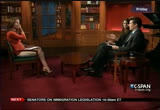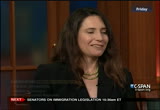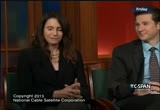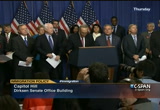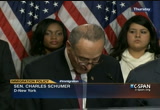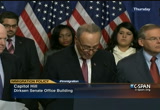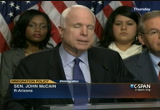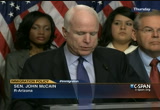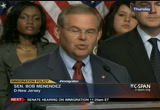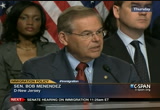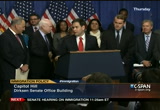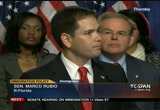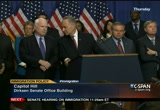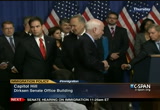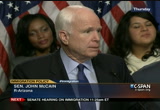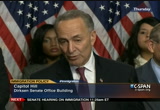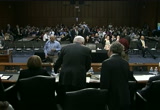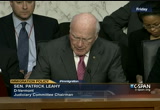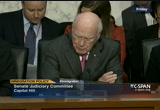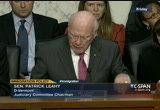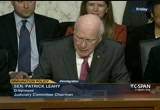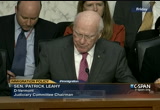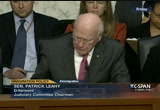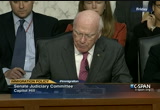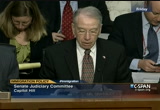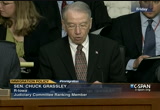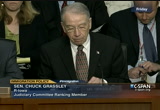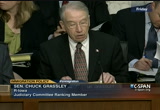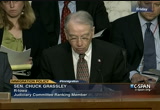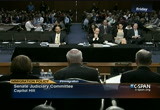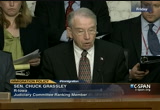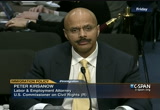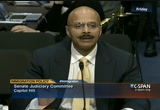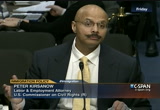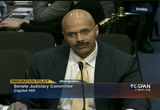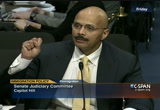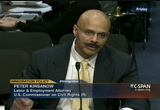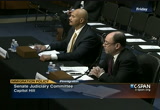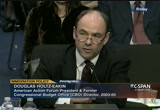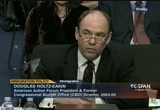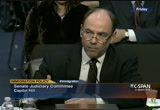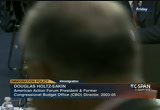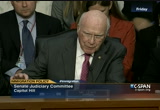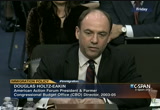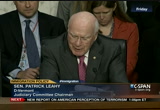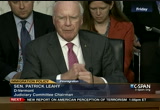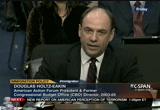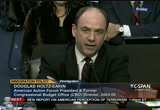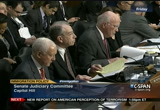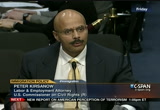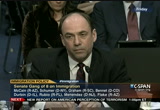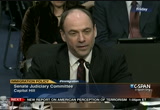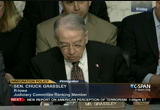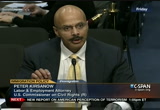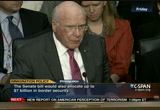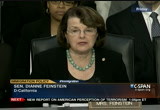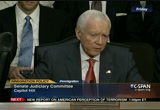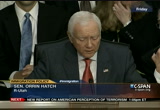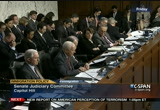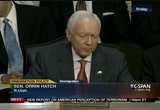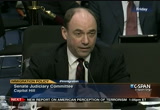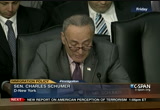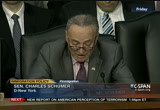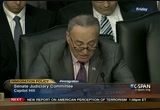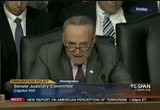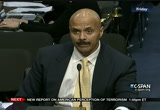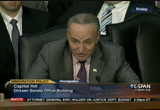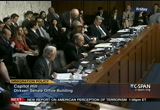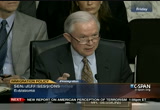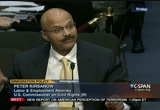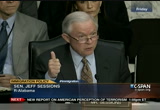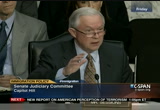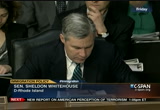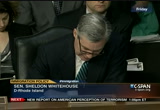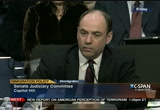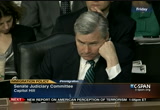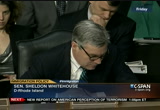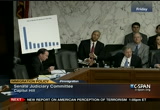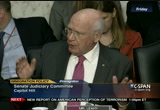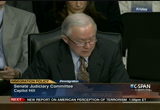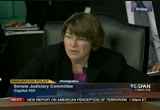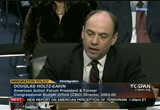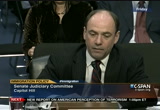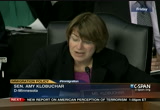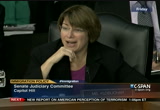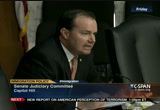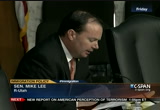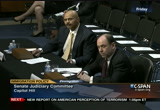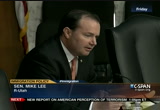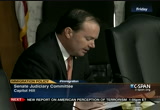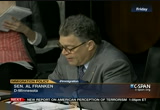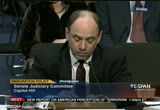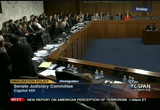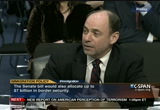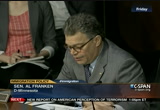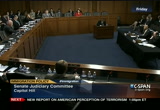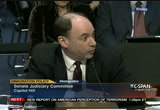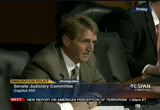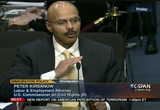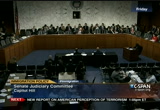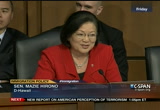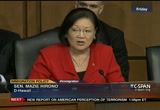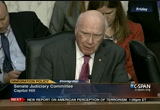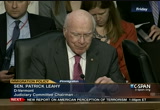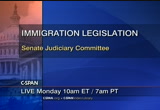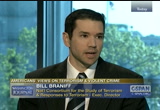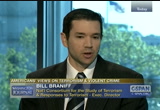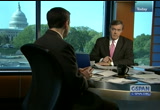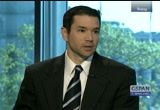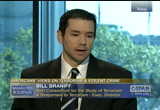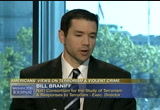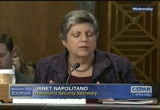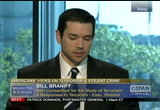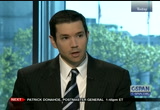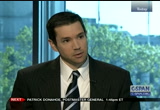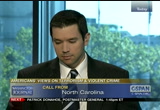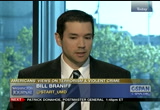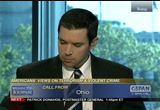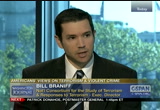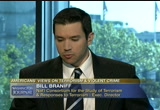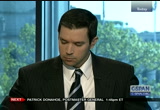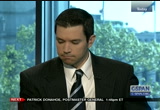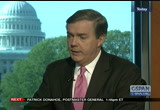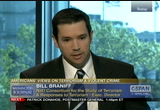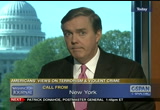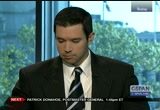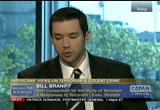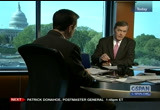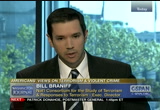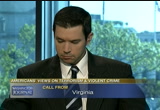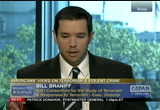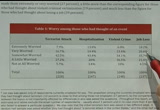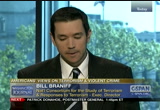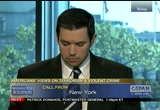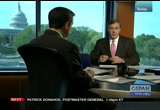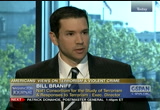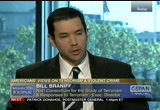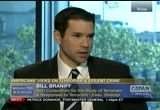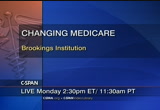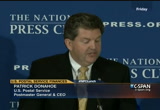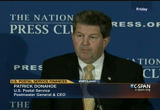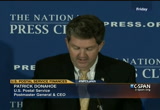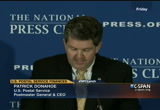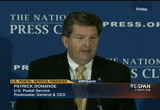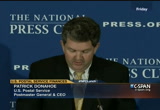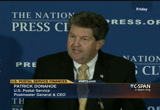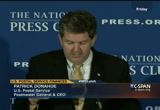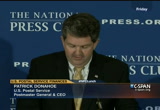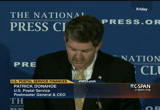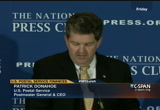tv Washington This Week CSPAN April 21, 2013 10:30am-2:01pm EDT
10:30 am
relatively quickly. >> he said he would call on the president to stop deportation. he still calling on the president to stop those deportations. interestinga lot of questions that will be post about that. it is safe to say that once the bill goes into affect, the legalization will happen almost immediately. from there the system ship will be a decade or more down the road. >> the presence of: all of this? -- the president's role in all of this? >> he has been the biggest critic of the president on immigration in that.
10:31 am
some have said obama has not helped them. he got himself a resident front of the white house. >> won this was last thing discussed in the bush administration, there were members and members on the hill every day. i'm not saying that now appears it >> thank you very much for your time -- i'm not saying it seems -- i'm guessing that now. >> thank you very much for your time. [captioning performed by national captioning institute] [captions copyright national cable satellite corp. 2013] >> a look on the debate over immigration policy.
10:32 am
a bipartisan group of senators talk about their work on .egislation now the bipartisan kissinger is making up the gang of eight -- of centers making up the game of eight. >> good afternoon, everybody. we are here to announce that eight senators, from opposite sides of the political aisle, are coming together on a common- sense immigration reform proposal that we believe can pass the senate. i want to thank my seven other colleagues here today. each one of us is strong each one of us has
10:33 am
beliefs, differing beliefs, but if you would have in any of our 24 meetings and seen everyone argue strongly, but then come together realize that we had to pass a bill and not everyone was going to get each thing he wanted, it was a sight that would give you some faith in the future of our democracy on a morning like this. we know our immigration system is broken, and it is time to get to work on fixing it. immigration reform is vital to securing our borders, just
10:34 am
starting our economy, and ensuring for access to that great american dream. the current status quo on immigration makes no sense. we turn away people from entering the country who could create thousands of jobs and let in people crossing our borders who take away jobs. our approach is balanced. the border security triggers are strong, but achievable. the path to citizenship is tough, but it is accessible. yes, our bill does secure the border first, but it treats the situation of those living in the shadows as an equally urgent priority. this is by design. we believe that americans will support sensible solutions to dealing with the undocumented and future legal immigrants, but only if they are convinced there will not be future waves of illegal immigrants. when the 11 million come out of the shadows and it will not only improve their lives and their families' lives, it will strengthen our country and its economies. in fact, conservative economist douglas holtz eakin has found that immigration reform will save taxpayers $2.7 trillion. we wanted this legislation to meet the highest possible standards of transparency.
10:35 am
to that end, the bill has been online since tuesday night. we will not begin markup until the first week in may. this will give everyone three weeks to read this bill and prepare amendments. chairman leahy has pledged an extensive markup. the judiciary committee includes some of the leading opponents of the reform who will have their opportunity to challenge our ideas. this ensures the bill will emerge from committee battle tested. then we anticipate a full and fair debate on the floor. senator reid has proposed -- has pledged to take it up no later than june.
10:36 am
as with any compromise, no one got everything they wanted. there were moments when it looked like an agreement would not come. the negotiations over a flow program were particularly intense. but realizing the high stakes, the business community and organized labor rose to the occasion. when tom donahue from the chamber and richard trumka from the afl-cio got on the phone together on a friday night in late march and signed their names to the effort, it became clear an agreement was possible. other stakeholders came together as well. many of them are here today, and we thank you all for helping us make this dream become a reality. [applause] so, if you're wondering why we are confident we can be successful in passing immigration reform this time around, look right behind me. these folks here.
10:37 am
an unprecedented coalition has formed in favor of immigration reform, farm workers, growers, business leaders, the faith community, some of the most well-known conservative activists in washington, and some of the most progressive. powerful outside forces have helped defeat other initiatives in washington, but on immigration, the opposite is proving true. i'm convinced this issue will not fall victim to the usual partisan gridlock. and we are mindful that we approach our task at a moment when the public has never been more fed up with congress, but in a week when disillusionment with politics is being acutely felt, this bipartisan breakthrough offers a degree of
10:38 am
hope. personalities, and even stronger disagreements on many issues, we met in the middle for the common good. that bill has proved the art of political compromise is not dead. in conclusion, today is just the beginning of our voyage. it will be long and arduous. there will be perils we cannot even anticipate. but we start off with optimism, because this bipartisan agreement gives us a sturdy ship to ride out the storm ahead. lastly, i would like to mention some one who could not be here, but who is on the minds of all of us today, the late ted kennedy. he is a hero to many of us on both sides of the aisle, and especially on this issue. upmany ways, our work picks where he left off. and now i would like to turn the podium over to ted's longtime partner on this issue, a man who has become a great personal friend of mine, john mccain. >> thank you, chuck, and thank
10:39 am
all of you, and i want to obviously express my deep appreciation to all of my seven colleagues. it is well known in the senate that i am not the easiest guy get along with. but i must say they put up with my tantrums and they put up with a lot, and i want to say thank you to all of you for really doing something that america deserves. to paraphrase churchill, this not the end of the process, the end of the beginning. there is a long and difficult road ahead. committee hearings, markups,
10:40 am
open amendments will be offered. some will be intended to it, some will be offered in hope of killing it. none of us expect the bill to be identical with the one we introduced today, but we are all united in our determination that this, at the end of the day, remains a fair, comprehensive, and practical solution to a difficult problem that most americans can support and that stands a good chance of passing the house and being signed into law by the president. the legislation is not perfect. there are provisions that most if not all senators can support. some will appeal to more than others. no one will like every provision. still images and our economy and neglect our humanitarian responsibilities. magnitudeof that would never be easy to address
10:41 am
and never more necessary. cannot be achieved by means .arry it we have addressed labor needs of a growing and competitive economy with a workable worker policy and sensible expansion of hi visa programs. we make it more difficult for employers to hire people who come here illegally. we have confronted the reality of people who came here illegally by proposing lengthy practices and does not place lawful immigrants at a disadvantage. finally, we have recognized our most people who cross
10:42 am
borders illegally overstay their visas have done so for the same reason that attracted other immigrants here -- to find economic opportunity and a better life for their families and to live in a society that values human dignity. we cannot sanction their violation of our immigration laws, neither can we continue have people desperate for a better life be exploited by unscrupulous human traffickers and abused by violent criminals and left to die in our deserts. yes, we offer a path to citizenship for people who did not come here illegally. they are here. realistically, there is nothing
10:43 am
we can do that would reduce them to return to their countries of origin. many of them have made valuable contributions to our society if will provide even more they're brought out of the shadows and are in compliance with our laws. as i said, it is a lengthy passage. we have tried to make it easier to work here legally. it is harder to do so illegally. we have done our best to resolve the many different parts of this complicated problem. we expect and welcome suggested improvements to the bill by our colleagues in the debate and amendment process. we will oppose only those amendments that are intended to prevent a comprehensive solution from passing and thereby perpetuate our current failed immigration system. there is no greater satisfaction than this job and working
10:44 am
members from both parties in a good faith effort to serve the nation's interest. i thank my colleagues for the privilege. [applause] >> thank you to chuck and john. i can remember one of the earliest meetings of this group when we started talking about what the bottom line is. what is not negotiable? why are we here? i can remember the democrats saying whatever we write, it has to be fair and protect american workers. i recall the public and saying, whatever we write, have to be firm in protecting our borders. bottomocrats said the line is to have a path to
10:45 am
citizenship so people living in the shadows -- republicans said they have to earn their way on that path. pay their taxes. have a job. learn english. it will not be easy. they have to earn their way. those are the basic principles that started this conversation. i think there were about money for meetings that took place as it came together to talk about all of the issues that are part of this 800 less page bill. it is not perfect, but it is a good faith, common sense approach to fixing a badly broken immigration system.
10:46 am
there are several reasons why we are here and why i'm here. first, the american people want us to do something. the notion that we would and this process with the same broken immigration system is unacceptable. we believe that we have come up with a good approach, one that would make the country safer and more. second, i want to talk about an issue that touches my heart. that is the dream act. this is an issue which means the world to me and to many young people across this country. i want to thank my colleagues. the evening that we set aside for the dream act was a short meeting. everyone said it was time. it is time not just because it is a good idea and there is wisdom behind it, but because we have come to know the dreamers, those young people brought to this country by their parents with no decision in the process, those young people are now stepping forward. they spent most of their young
10:47 am
lives being told, keep your head down. don't sign anything. if the police show up, go quietly to the exit because you can be deported in a second. having learned that as children, he realized to be part of the political process, they had to do the opposite. they had to stand up at great personal risk and introduce themselves and tell their stories. three other stories represented today, gabby, came to the united states is from ecuador at the age seven. the highest-ranked junior rotc student at her high school. three years ago, gabby and three other dreamers walk from miami, florida to washington, d.c. the 200 miles to build support for the dream act. they were joined by hundreds of young people. some dreamers and some young supporters. they called it the trail of dreams. thank you. [applause] we have another in the middle.
10:48 am
brought to america from nigeria as a child. 2002 she graduated from a prestigious university in virginia with a degree in chemical engineering. it has been 10 years since she graduated. she has yet to work a day as a chemical engineer because she is undocumented. thank you for being here today. and we have another. [applause] brought from peru as a child. she graduated. she started connecticut students for a dream. a statewide organization advocating for the dream act. all three of these young women have dedicated themselves full- time to helping pass a
10:49 am
comprehensive immigration reform not just to help themselves, to help mom and dad and their brothers and sisters. when i look at these three, i see that encourage, hardware, and determination that makes america this nation of immigrants the greatest on earth. someday, it is my prayer that the immigration law becomes the law of the land and i can attend that nationalization ceremonies and watch these people swear an oath of allegiance to this country that is their home. on that day, america will be a better and stronger country. thank you. [applause] >> i think it would be appropriate to refer to the bill as a schumer mccain bill. these two senators really started this process. they have the smallest egos among us. [laughter] they would wear it better than the rest of us. i hope the third time is the charm.
10:50 am
this is the third time i have been involved and try to fix this problem. ofhink 2013 is a year immigration reform. we have many people involved. we will either have a bill or get into a heck of a fight. why do we have 11 million immigrants? america is an idea. no one owns it. it is not owned by a race or ethnic group or any particular religion. it is an idea where it has grown for 200 years and gotten better. we will always have a problem, but as long as we keep that idea in tact of -- we have a right and responsibility to control for the good of our nation. the fact that we have so many people wanting to come here anyway they can come here, walk through the desert, swam a river with a kid on their back, they will come. that is a testament to what we have done as a nation for 200 years.
10:51 am
all we're telling the world and and our neighbors and our friends and fellow citizens is we have to create order out of chaos. if you are here illegally, it is not much of a stretch for a guy from south carolina to imagine what life must be like to imagine living in this country illegally. not knowing if the next knock on the door someone coming to take you and your family away.
10:52 am
it is not much of a stretch for a guy from south carolina to understand what it is like to live along the border of arizona and texas. bob menendez has been one of the biggest advocates. about the pathway to citizenship, learn the language, pass the exam, pay a fine, work, have a criminal background check. this is no easy task. [laughter] i'm glad were not applying ourselves. the hope is that america is ready for immigration reform. look at the polling. is congress ready to do something we should have done a long time ago? i believe we are. if you think the border can be better secured, we have an idea to be considered. if you think there is a shortage of legal labor and the current system is too hard to access, we have an idea for you to consider. if you are a union member or an average american word about losing your job because of the cheap labor coming into your country, we have an idea to prevent that. if you are in the shadows and you worry about what is going to happen to you, we have a solution. you have to earn the right to be an american. it is fair and tough, but it
10:53 am
will be available. i have got one goal -- when this is all said and done, there'll not be a third wave of illegal immigration. ronald reagan gave amnesty to millions of people and congress failed to follow through. if we do not fix the broken immigration system and all the things we should have done many years ago, shame on us. this bill fixes the problem. i will fight for this bill. if you have got a better idea, bring it on. if you want to kill it, we will have a talk about that.
10:54 am
we have always welcome newcomers to the united states. we will continue to do so. but in order to qualify for the honor and the privilege of citizenship, our laws must be followed. the world depends on an america that is strong economically and militarily and ethically. the establishment of a stable and efficient immigration only supports those goals. as a nation, we have the right and responsibility to establish clear and just rules for citizenship and control the flow of legal immigration and to eliminate illegal immigration. that paragraph sums up what i'm trying to do. knowr fellow citizens, we congress is broken. this is an effort by four democrats and four republicans to prove to you and the rest of the members of the senate and eventually the house that it does not have to stay broken. thank you. [applause]
10:55 am
>> it was an extraordinary experience to work with my seven colleagues. having the benefit and tenacity of chuck schumer and john mccain to get us to the finish line, but also to have members like lindsey graham who overall had very little to gain from taking on a tough challenge like immigration reform, but willing to do so that he knows it is in the national interest and national security and the economy and what is right. that epitomizes all of my colleagues efforts. at the very beginning, i was not sure of the commitment of all of my colleagues. i must say they're shortly after the first few meetings, it became way too mean that there were tough moments that there
10:56 am
was a real desire to solve a problem that has for too long gone unsolved. i salute each and every one of them. it was one of the highest moms i have had in the senate, but even in the 20 years of being a house of representatives in congress. i'm looking forward to keep in that same tenacity and commitment. our system of immigration is broken. americans know that. they want to see it fixed. this is about preserving the national security. it is about enhancing the national economy. it is about preserving an
10:57 am
american tradition that has had an exceptional reality of the greatest experiment in the history of mankind, bringing people from across the globe that america has had to offer and preserving them in a way that recognizes the loss. as part of that, i have said that one of the key issues is making sure that we find a way to bring people out of the shadows and into the light and to have a 11 million who are undocumented in our country come forth and register with the government and go through a criminal background check. if you pass that criminal background check, then prospectively get a temporary permit to be in the united states and pay your taxes and learn english and ultimately have a pathway to becoming a permanent resident. after that, united states citizen and fulfilling your
10:58 am
dream and contribute into the nation. this is a long pathway. it is a tough pathway. it is an achievable pathway. it creates a real opportunity for these individuals. there are some who will argue that we do not need immigration reform. well, i cannot secure america unless i know who is here to pursue the american dream versus who might be here to do harm.e unless i get millions out of the shadow into the light and register with the government, i will not be able to ascertain that. i cannot secure the nation unless we do what some of our colleagues have sought in an overall border security and enforcement and exit/entrance strategy. i care about american workers. i do not want to depress his or her wages. the last thing i want is people who are exploited and create downward pressures on wages of all americans. even in this economy where there are some tough opportunities at trying to find a job, there are some jobs or we anyone to immigrant
10:59 am
labor to do it. if you had some vegetables for breakfast or dinner last night, they were probably picked by an immigrant worker under a hot sun. get chicken for lunch today, it was probably what might hands of an immigrant worker. if you have a loved one, they're probably being taken care of by the strong hands of an immigrant worker. this is about ensuring that the national economy is further promoted by making sure we do
11:00 am
not depress wages and that we have people who pay their taxes and pay their way and at the same time promoting the opportunities for even greater jobs. you cannot be the concierge. to have their son one of the united states senators growing up poor and going to public schools is an enormous part of the american experience. we have the best and brightest in america. young men and women who came to this country through no choice of their home, they came here because their parents came here when they were children. the only national anthem they know is the star-spangled banner.
11:01 am
the reality is america is their home. after enormous investments in them after education and they have the opportunity to contribute to america's wealth, growth, and competitiveness we turn our backs to them. so this is a moment to meet one of america's tough challenge in a way that it smart, secures our borders and at the end of the day preserves our history. -- is smart, secures our borders and at the end of the day preserves our history. [speaking spanish] [speaking spanish]
11:03 am
[laughter] >> not again. not again. >> once was enough. [laughter] >> it's been fun. one of the things that makes our nation special and different from the rest of the world, we're a nation of immigrants. it can't be said enough. what distinguishes us is because we have a collection of the world's best and brightest. people who refuse to accept the constricts and limitations in the society in which they live. they believe they are destined for more. people have come here, millions of people over 200 years and worked to build the greatest society of all man kind. like every sovereign nation we
11:04 am
have immigration laws and they need to be followed. the result is we have millions of human beings who are in violation of the immigration laws. this is a problem we have to solve and it makes it worse that we have a broken immigration system. it is cumbersome, complicated, and it does not reflect the needs of the 21st century. it is about modernizing our immigration system. it about attracting the world's best and brightest talent and keeping them. it is about ensuring that american businesses, not at the expense of the american worker but businesses have access to seasonal labor as needed. it is about enforcing our immigration laws. it is ensuring that the federal government does what it is supposed to a in a way that is effective. that's why we say the federal government has to secure it's border and if it fails the states most affected by it will take care of it for them.
11:05 am
we want to ensure that the magnet of illegal unemployment is not drawing people here in the future. 40% of our illegal immigration problem is visas overstays. we have to deal with the reality, not theory but the reality that there are millions of people living here today in violation of our immigration laws. they did violate our immigration rights and they don't have a legal right to be here. we're dealing with this, not because we legally have to but it is in our national interest of the nation. it is not good for this country to have millions of people living in shadows. number two we're dealing with this issue because this is who we are. we are the most compassionate nation on earth.
11:06 am
we're the people who welcome people from all over world for 200 years. we embraced it. because we did, those immigrants, each of us have created here the single greatest society that man has ever known. we are the descendents of the tired, the poor, the huddled masses that yearns to breathe free. it is tragic that a nation of immigrants remains divided on the issue of immigration. this must once again become our strength. i believe through this effort we can make this happen. let me close to one final point to my americans who share the belief in free enterprise who elected me. america is a nation of immigrants but republicans and democrats have failed to enforce the laws.
11:07 am
we're not going to deport them. so let's secure the border. let's bring these people out to of the shadows. they will undergo a background check, they will pay a fine, they will start paying taxings. they won't qualify for federal benefits. we all wish we did not have this problem but we do. leaving things the way they are, that is the real amnesty. we have to fix it. [speaking spanish]
11:08 am
thank you. [applause] >> i thought i might go last to allow me to say i agree with everything that was said and sit down but jeff you're going to get that honor. i want to thank my colleagues up here showing me that the senate can work. -- how the senate can work. it is going to take more for us to get this bill passed and it is incredibly impoortant for people of my state. the leadership of mccain and schumer throughout this process has been outstanding. it is everything i wish i could have seen from the first day i got here. when this bill is passed it will be an affirmation of two great ideas. we're committed to the rule of law and we're a nation of immigrants.
11:09 am
it is those two ideas working together that decade after decade has enabled every generation to invent the future. now it is our time in the 21st century to decide whether we are still up to that task. whether we can don't invent the -- acan continue to invent the future, not just here but for the entire world and recommitting ourselves to these two notions is going to be a central part of moving us forward. i want to thank the people in colorado who told me about how the broken immigration system is affecting their lives and their work. the peach growers, the cattle ranchers, the people working in the high-tech field, the people who were the dreamers when i was superintendent of the denver public schools. each one is struggling to get ahead and everyone feels burdened by a broken immigration
11:10 am
system that is not working well. they get up every day working with whoever it is, republican, democrats, neighbors they don't like to drive their family forward. the least they can expect from the united states congress is that level of effort. it is going to take that level of effort to get this passed. i think the leadership that senator schumer and senator mccain has shown on this will guide us to the very end. thank you very much. [applause] >> i want to say that in spanish. [laughter] >> i'm the new guy here. i just arrived from the house this term. i was in the house last week visiting some of my old colleagues and one of them said, how is the senate, who you hanging out with?
11:11 am
i said actually schumer and dick durbin. i never thought i would say that. i don't know what this bill will be called in the end, we can be assure that it will not be called the flake bill. this has been a wonderful process. let me tell you i'm new to the senate but i'm not new to this issue. we worked this issue in the house for a number of years. i grew up on a ranch in northern arizona working alongside migrant labor. many undocumented immigrants there. i saw what they went through, i saw how hard they worked. i saw their motivations to have a better life for themselves and their families. this has always been a personal issue to make sure they can have a process and an opportunity to do what we allow them to do here.
11:12 am
to the citizens of arizona who are concerned about the border, let me tell you that arizona has borne the brunt to have a secure border far long time. let me say this is a good bill. the border security provisions have are sound and strong and we'll make sure they remain in the bill. let me say a word in the end, all of us want to pay tribute to our staff. this was a very difficult bill to write. [applause] let me tell you, translating conflicting or confusing messages from the members is
11:13 am
difficult. as john mccain always said that reward will be in heaven. i appreciate being here. this is a good piece of legislation. we look forward to seeing it through. thank you. [applause] >> ok. we'll take a few questions. >> gun legislation, for background checks it seemed like it would have bipartisan support. what is your group going to do to make sure the same thing doesn't happen with your legislation? >> first of all, i think we have a strong foundation. the eight of us did not get together on a whim. we've been working for three months and struggling through these issues and each giving and getting to know each other. that is number one. second, i think i can speak for both caucuses, i think the majority of people in both caucuses want to get this done. people for different reasons, from different regions. other people are at extremes from those caucuses that don't. but i think this is ours to
11:14 am
lose. i think we have a great product here. it will need improvement but it is really strong and i think we have great unity among ourselves that will keep this going through. i don't think it is at all like the gun control frankly, because i think the product that we're starting out with has broader support on a broader basis then guns did in the country. >> can i mention one compelling reason? right behind behind me. when you look at the representation of business, labor, across the board. this is a coalition. i never thought i would be standing here with them. i want to thank you richard. i want to thank our chamber and grover norquist. this is why we will succeed.
11:15 am
it is because of this broad base and dedicated legislation. >> they are the wind beneath our wings. >> can you justify adding more people to the work force with millions of unemployed blue collar levels? >> when unemployment is above a certain level it will come at a time when unemployment is low. in each case, every one of suss -- us mindful of this, anyone who wants to bring in a new worker has to look for an american worker and advertise for an american worker. >> can you give us an idea on where you anticipate the biggest challenge in selling this to your colleagues?
11:16 am
>> one word that underlines this proposal is balance. there are things for almost everyone to like in this bill and there are some things that each person will not like. when you put it all together for a vast majority of people across a spectrum there's much more to like than not like. that's how i think we'll get it done. what is going to make it successful more than anything else is the need to solve the problem and the product, through a lot of hard work of our staffs have created with the backing of the people behind us. >> senator mccain, is there any particular element of this bill that you think if it were to be modified would contribute to it falling apart? you said there are a lot of good things in the bill but is there any particular thing that you would draw the line as a group and it would fall apart?
11:17 am
>> as i said in my opening remark, we're committed to good changes in the bill. this is not a final product. but we are also committed to vote against amendments or proposals or changes that would kill the bill. there's a difference there. we're not saying it is a perfect piece of legislation. we think it can be improved on. we also know opponents will be proposing amendments that if passed could collapse this fragile coalition that we've been able to achieve. again, i would like to point out, depend on how you ask the question. 70%-80% believe these individuals should be given a path to citizenship as long as they pay back taxes, pay a fine, get in line behind everyone else. they believe that is fair. that i think is one of the fundamentals that i think will
11:18 am
help convince my more conservative friends. yes? >> senator mccain, what is the main difference in the language of the bill compared to the mccain/kennedy bill? --w much will the political -- ntribute ons cop to a change in support for the bill? >> i think most republicans -- many more republicans than the last time are aware as marco and bob pointed out so, i think graphically that the status quo is not acceptable. the status quo is not acceptable. if you believe that then you are willing to make compromises that may not fit your exact plan or proposal for immigration reform. that's why it is so important that the eight of us -- there is
11:19 am
varied backgrounds and varied view points and that's why we have come together. the other thing about it is -- and a little straight talk here. straight talk. republicans have got to compete and i say compete for the hispanic voter. passage of this legislation in my view and i think my republican friends agree with me, doesn't gain a single vote from the hispanic community. but it puts us on a level where we can compete in a battle of ideas. we think we win with lower taxes, less government. we think we win. [laughter] let me just say -- right now a little straight talk. right now we're not competitive because this issue has to be resolved in the minds of our citizens who feel this is a vital, important issue that needs to be resolved.
11:20 am
>> in 1955 when i was born how many workers were there for every person retiring in this country? 16. how many are there today? three. how many in 20 years? two. where do the workers come from? 10,000 baby boomers are retiring a day. one day it will be john. john's mother is 101. everyone is living like john's mother. that is the good news. if we don't reform medicaid and medicare we're going to be greece. if you don't have a legal immigration system to supplement a declining population you're committing economic suicide. here's the key to bring people from all over the world not just the people who live next door. bring them in on your terms not
11:21 am
theirs. to those who say we don't need legal immigration you're crazy. look at what is going on in america. we're declining population, we need the best and the brightest and sometimes the best and the brightest is the guy who starts as the janitor. i'm into this idea of supplementing america. tell me how it costs more to have people paid under the table, living in fear, roaming around the country undocumented versus having them in a system where they get paid over the counter, taxes are taken out and they get no benefits for 10 years. that makes no sense. the only way america loses is to do nothing. to those people who believe we don't need legal immigration in the future you're in denial about the demographics. for those who say this costs more to take people out of the
11:22 am
shadows and put them in a legal status and have them pay taxes you certainly lost me. that makes no sense. >> for those who want an english translation of senator graham's remark i will be glad to provide them. >> one last question. >> everyone here in washington is concerned about cost, money. some members worry about this bill that the bill has budget in it to avoid -- [unintelligible] how do you respond to that? >> there are no gimmicks at all in this bill. from the get-go we make sure this bill is revenue neutral. obviously, there is cost in this bill, securing the border, setting up the system, making sure the exit and entry system works. we also have income, in fines
11:23 am
for those going to be on the path to citizenship as well as fees for companies that want to bring in workers will pay. one never knows how it works in c.b.o. we don't know how they will score it. for some reason that c.b.o. gets away from that, we will work before the introduction to make sure it is deficit neutral. that is one of our bottom lines. thank you, everybody. >> senator chuck
11:24 am
11:25 am
11:26 am
the bipartisan proposal, we have established a path to citizenship for the 11 million undocumented immigrants in this country. it addresses the lengthy backlog in our immigration system. agricultural workers are in essential part of our communities and work so hard to provide our nations food supplies. it addresses the needs of our .aw enforcement community
11:27 am
it improves the treatment of refugees and asylum seekers. i appreciate the fact that we have four members of this committee who worked with others, and forming a bipartisan consensus. thanks to senator schumer and durbin for that. and senator feinstein, who has taught me a lot more about immigration than i would've learned otherwise. the bill includes what some are .alled -- calling triggers
11:28 am
i do not want people to move out of the shadows but be stuck wean underclass, just as should not call dreamers who were brought here as children, we should not make future status dependent on border enforcement commissions over which they have no control. at this point, we are not treating all families equally. we have to antidiscrimination against gay and lesbian families. i am concerned about changes in the visa system for siblings. we lack clarity about how the new point basis system works in practice. whether spending billions more on defense between united states and mexico is a really good use of our taxpayer i do know that each
11:29 am
one of us can write what we want. each one of us may have a different bill. very difficult concessions by all involved. i mentioned senator schumer, durbin, senator graham, senator feinstein, mccain, menendez, all worked on this. so now we are bringing this to the public. we will find a time for secretary napolitano to come before the committee. i hope this will give the public an opportunity to learn about it. unlessly every one of us
11:30 am
we say we don't know how to read, everyone of us will have plenty of time to analyze this bill before we actually start marking it up in may. just a member, immigration has been an ongoing source of renewal of our spirit and creativity -- remember, immigration has been an ongoing source of renewal of ours are it and creativity. spirit and creativity. innovation for our companies. our nation continues to benefit from immigrants. we need to uphold the fundamental values of family and hard or can. -- work.
11:31 am
foreign agricultural workers ofport vermont growers, many whom move into the fabric of vermont's agricultural community. of us.stem affects all now is our time to fix it. act to liberally. but we have to act. we can talk about it, but eventually we have to vote. millions of people are depending on us. editor grassley -- senator grassley? >> we feel that the secretary is doing exactly what she should be doing. an opportunity when things settle down to question her. we also appreciate the opportunity to talk about immigration, particularly in
11:32 am
light of all that is happening in massachusetts and over the last week. i know that the of boston and watertown are in everybody's thoughts this morning. we're here trying to understand why these events have occurred. it's hard to understand that there are people in this world who want to do americans harm. this hearing is an opportunity to refocus on the issues and importance of remaining vigilant and secure in our homeland. that 30 years ago , 1983, this committee held a hearing to discuss immigration reform control act. senator simpson, the author of the bill, opened the meeting by presenting the bill and sitting its purpose. quote, its purpose, a very simple one, to control illegal immigration in the united states and to control illegal -- illegal
11:33 am
immigration. the first duty of a sovereign nation is to control its borders -- legal immigration. the first duty of a sovereign nation is to control its borders, and we do not do that. theyill we debated that would provide legalization for millions of people already in the united states. on that day, senator simpson we arefurther, attempting to ensure that this is a one-time only program. the bill we are considering today according to the bipartisan group of eight senators who crafted it will quote, ensure that this is a successful, permanent reform to our immigration system that will not be revisited. end of quote. 30 years later, we are proposing the same remedies and asking
11:34 am
the american people to trust that we will get serious about it. i have to applaud like other people have the group of eight senators for their commitment to reforming our broken immigration system. time will tell if this bill solves the problem, to ensure that this is permanent reform to our immigration system so we do not have to revisit it. , theghout the debate, s-44 border security economic opportunity and immigration modernization act, i will be asking whether this bill avoids the same mistakes and truly fixes our immigration system for generation to come. we thought when that bill passed in 1986, that is what it did. we did everything in good faith,
11:35 am
making it illegal to higher illegal people for the first time. we did not look far enough ahead. we did not look far enough ahead. this bill needs to go through the committee process. i have argued that this bill for open amendments consideration. we are told that it will. must have the opportunity to read, analyze, and improve the bill. off to a rough start from the standpoint of the majority is rushing to read and analyze the bill, it's just under 900 pages. there are some new concepts. most members of staff have not read the bill in its entirety before this hearing. we should be afforded enough time to understand and debate the bill. we have been assured that we will.
11:36 am
before the judiciary committee met in 1983, the subcommittee had for hearings before reporting the bill to the full committee. the year before that, the committee held 16 hearings and five consultatns prior to the markup of the same bill, the committee had 100 hours of airing said 300 witnesses. we have experts -- and 300 witnesses. we have experts to hear from. we need to understand how changes in our visa program will affect businesses and american workers. we need to know how new concepts and be put into practice, the impact the bill will have on taxpayers. like weto get it right thought we got it right in 1986. given the events of this week,
11:37 am
it is important for us to understand the gaps loopholes in our immigration system. while we don't yet know the immigration status of people who have terror rise to communities in massachusetts, -- terrorized communities, it will shed light on the weaknesses of our system. how can we beef up security checks on people who wish to enter the united states, how do we ensure that people who wish to do us harm are not eligible for benefits under the immigration laws, including this new bill before us are it we have a long -- as. -- us. we have a long road ahead of us. we cannot accept anything less than a transparent process. we thought we were doing it that way in 1986, but we screwed up and we can't afford to screw up again. thank you. and with that, which is why
11:38 am
we're going to make sure we're not going to be voting on this until sometime next month we will have it open -- with all , itdoubler -- deliberations will be streamed on our website. i understand there are an awful lot of people watching. please go ahead. ?s your microphone onk >> think you. i'm here in my personal capacity. the commission on civil rights was established pursuant to the 1957 civil rights act to examine matters related to protection and race discrimination.
11:39 am
because immigration often implicates matters pertaining to national origin and discrimination, the commission over the years has regularly conducted hearings on aspects of immigration, including illegal immigration. the most recent such hearing occurred dealing with a specific issue of the effect of illegal immigration, the wage and employment levels of workers. the evidence introduced show that illegal immigration has a disproportionately negative effect on the employment and wage levels of low skilled americans, specifically black americans. >> we are still having a little bit of a hard time hearing. can you get that closer? >> the witnesses at the hearing were experts in immigration who spanned the ideological spectrum. every single witness agreed that illegal immigration had a demonstrably negative effect on
11:40 am
employment opportunities and wage levels of low skilled americans, specifically black americans. thisvidence as to why impacts black americans is quite basic. black americans, specifically black males, are disproportionately concentrated in the low skilled labor market , disproportionately more likely to only have a high school , likewise with immigrants. these two groups compete against one another in the low skilled labor market. that competition is often most fierce in those areas of the economy where blacks have historically been highly concentrated. blacks freakily lose out on that competition, crowded out by illegal immigrants -- frequently lose out on that competition, crowded out by illegal immigrants trad.
11:41 am
because black americans, low skilled americans are unwilling to work. there unwilling to work at the cut rate given to illegal immigrants. they're highly unlikely to complain to osha. much of the competition is concentrated in major metropolitan areas such as new york, los angeles, chicago, but also enroll areas and the southeast states such as georgia, north carolina, -- in rural areas such as the southeast states such as georgia, north carolina. when the commission conducted its investigation originally, the unemployment rate for blacks without a high school diploma was 12%. ,oday it has more than doubled
11:42 am
24.6%. that clearly shows that we have an oversupply of low skilled labor relative to demand and that bodes ill for all workers in such class, particularly black americans. research shows that 40% of the 18 point percentage decline in employment rates of black males is attributable to illegal immigration. that is hundreds of thousands of blacks without jobs, which translates to hundreds of thousands who can't pay taxes and don't support their families on their own dime. in addition to depressing employment levels, illegal immigration drove down wage levels. studies by the federal reserve bank of atlanta show that illegal immigration was attributable -- a spike in illegal immigration was attributed to the decrease in wage levels of documented georgians.
11:43 am
for doctors and lawyers, $960 may not be a lot. ,ut as president obama observed $80 per month is significant for most families. the goes towards groceries, rent, gasoline. recent history shows that grant of lawful status further increases the influx of illegal immigrants, further forcing out low skilled laborers and thereby depressing the wage and employment levels of those americans. in addition to that, that necessarily leads to more americans depending on the government for subsistence. it swells the ranks of black unemployed and drives down the wages of those blacks who do have jobs. it is respectfully submitted, mr. chairman, that before the federal government grants lawful
11:44 am
status, due deliberation be given to the effect of that employmente wage levels of low skilled americans. the evidence before the commission is that status is not without profound cost to the american worker. thank you. thes with all witnesses, statement will be made prior to the record. the president of the american action form, formerly director of the congressional budget office under george w. bush o 2005.03 tw it's good to have you here. >> thank you. it's a privilege to be here. i have submitted a written statement for the record. let me make three points.
11:45 am
first point is that the immigration bill has many aspects. there are sectoral, economic impacts. , immigration reform represents an economic policy opportunity. an opportunity for the united states to dictate the evolution of its future population. the absence of immigration, low fertility rates means that the u.s. population declines. the u.s. isf dictated by immigration choices. the evidence is that new , andrants both work more have small businesses at a higher rate.
11:46 am
i have done some estimates that for benchmark performance suggests that he could have as much as nearly a full percentage point faster growth over 10 years. associated with that, every member of the committee would be pleased to see less budgetary pressure, faster growth using cbo rules of thumb, deafness -- her its by two and have that is something we have to onnk about, and not rely efforts that ignore economic growth. the u.s. is out of step with its economic competitors. under 10% of immigration into the u.s. is for economic purposes. this bill makes important changes to the visa system, basing the more on economic
11:47 am
considerations and represents a step toward using a policy mix that is closer to other industrialized countries. a legitimate concern is, what will happen to the federal budget? it is a concern i have been close to for a long time. a good way to think about the budgetary implications is to start with the last piece of comprehensive immigration reform legislation. the cbo had the opportunity to put out a score. that score indicated that if you look at the balance between spending and revenues, it would over 10 years increase the difference between $18 billion. $18 billion does not sound like a lot now. i think there are two things to remember about that $18 billion. since that time, many of the things that were policy objectives, border security and e verify system and other pieces of the infrastructure, there has
11:48 am
been spending on that about half of what the cbo expected would be needed has happened. those comparable policy objections now may be cheaper and generate less in the way of spending. has been thatng cbo did not use dynamic scoring. it did not take into account the potential economic growth effects that would change the impacts entirely. the last piece of what has happened, something i'm sure we will talk about, since that score, the congress has passed and the president signed the affordable care act. my reading of this legislation is there is a bipartisan commitment that those who would become registered provisional immigrants would not be eligible for benefits, certainly not for 10 years, realistically not for 15. there will not be a budgetary impact over that horizon. over the longer term, there is something that congress should keep in mind in terms of the
11:49 am
budgetary outlook. i would be happy to discuss with you the impact of this bill in that regard. i think the primary objective should be to make sure that when the many policy objectives are put on the table, economics does not get lost in the shuffle. opportunity for us to improve on our growth record, which has not been good. i look forward for the chance to answer the questions you might have about that. thank you. >> thank you very much. i know in economics, you hear about low-wage. people may be hurt by this. it's my experience that you have places where there's a large number of immigrants or undocumented that companies will show up and say here, we're going to pay you a flat rate for work for the day, you can't complain about it, you're not going to get any benefits, we're also not going to do any withholding to the government.
11:50 am
doesn't that pretty well undercut hiring somebody, even somebody at minimum wage, but doing it legally? >> i think the impact of immigration on low skill employment wages is a really important issue and i'm glad it was raised in the opening statements. let me separate into two pieces. the first is illegal immigrants in the united states, there, i think if you look at the bill, there are two features that are important to think about. one, it would put those workers on a level, legal playing field with u.s. workers, same workplace protection, same wage laws, thus changing that dynamic considerably. second is this is intended to cut off future illegal immigration. the border security, e verify, entry-exit visa triggers are all designed to do that. that changes whatever you may think the prevailing wisdom is on that.
11:51 am
>> for immigration in general, mr. chairman, i want to just make sure that people understand, the evidence is not as it was characterized. there is good reason to believe that immigration raises the wages of american workers, that they are complements to american workers, and i would emphasize two things. number one, if we're worried about the ability of low skilled americans to earn a wage, we should fix the low skill problem. that's the problem. it's not immigration. it's low skills. and if you think the competition begins when someone arrives in the united states, you're mistaken. we are competing with those workers now wherever they may be. >> you know, it's interesting, your testimony mentioned the, quote, immigration policy is economic policy. >> yes. >> you talked about the entrepreneurial vigor. i visited these companies, i know the founders of most of them. between 25 percent of our highest growth companies, between 1990-2005, including
11:52 am
intel, google, yahoo, ebay, employ hundreds of thousands of people a year in the united states, there are pretty good wages, they were begun by immigrants. in fact, 40 percent of the companies in the 2010 fortune 500 were started by immigrants and their children. that's something we should be thinking about. >> i would hope so. i mean, the evidence is quite clear on the capacity of immigration to bring entrepreneurship to the u.s. >> limited time here, but you released this analysis, including immigration reform with the proposal here, can boost the american economy by as much as one percentage point a year over the coming decade and reduce the deficit by as much as 2 1/2 trillion dollars. obviously, every one of us wrestle with budgets and deficits, it kind of perks up -- gives us our attention.
11:53 am
do you want to elaborate on that a little bit? >> i guess i would say a couple of things. first, arriving at that estimate is a matter of arithmetic, not particular ingenuity. economic growth comes from growth in people, and their productivity. and immigration controls both the size of the labor force and since immigrants tend to work more and participate at higher rates than the native-born, you get labor force growth. as you've mentioned, we often get small businesses and entrepreneurs, which raise the productivity of those workers, and there are benefits to faster overall economic growth in spreading innovation through the economy and thus raising productivity further. my estimates simply look at increases in immigration and follow the research, literature and rules of thumb for the impacts on gdp and on the budget. it's not magic. it's just arithmetic. i will say that it's important to recognize, i didn't tailor that estimate to 2013, '14, '15.
11:54 am
this bill looks like it will take some time to pass and implement, and that's fair. so you want to think of that as once you get up and running, what will the next 10 years look like. >> in fact, your testimony, you reference immigration legislation considered back in 2007. many of us were here at the time. some were concerned about the cost. but you say, quote, it is not 2007 anymore. it is important to consider what has happened since then to get a sense about the relevant budgetary effect that is have -- effects that have changed. you can elaborate on that, sir? >> as i said, i think the key spending aspects have changed in two ways. on the discretionary side, many of the policy objectives of that legislation, border security, e verification, there has been expenditure on those systems, and so not all of the spending needs to be done, so it should be relatively cheaper. on the mandatory spending side, as i mentioned, the key change has been the passing of the affordable care act. the drafters of the legislation
11:55 am
in front of us has, it looks to me, taken great bipartisan care to ensure that for the next 10- 15 years. that doesn't impinge on the budgetary cost to this legislation. >> thank you very much. senator grassley. >> thanks both of you as witnesses. first question to both of since we have a generation, very generous immigration system, even though it has problems, i've always argued that we must enhance and expand legal avenues for people who wish to live and work here. this bill makes many changes in those legal programs and increases work permits and green cards. so my question to both of you is do either of you have an estimate on how the legal immigration levels will increase if we pass this bill? >> i don't have an estimate myself but i will say this. responding to something doug said, and i respect his opinion on these issues, there is a
11:56 am
significant problem with respect to regularization. whether or not the senate wants to do so or not, it's not going to help the employment levels of americans currently. i think e verify is a good idea. outstanding. making sure that all workers are subject to the same legal requirements. outstanding idea. the problem is when you regularize 11 million people, the tiny advantage that current americans have in such competition evaporates. if everyone is subject to the same set of rules, then formerly illegal immigrants will be on the same playing field. it's not going to advantage low skilled workers here. we have -- 62 percent in the black community and certain demographics, one out of two men is working.
11:57 am
and despite what some may say, that illegal immigration or immigration period doesn't have any impact, i resort back to one of my other incarnations as a member of the national labor relations board and practicing labor relations law, it is palpable, the competition that is driven out by illegal immigration. you talk to minority contractors, businessmen, they will tell you, we cannot compete, and if these individuals are now regularized, in one fell swoop, the small advantage disappears. >> do you have a number for me dr. holtz-eakin? >> it looks to be 250,000, maybe north of that, depending upon the expansions, but i would be happy to get back to the more precise estimate as we become more comfortable with it. >> i'm going to ask you, dr. holtz-eakin, a question that deals with dynamic scoring, your use of it.
11:58 am
i know you believe in it, i believe in it, but cbo only scores steady scoring. and we also had a vote on the budget bill, where 48 democrats in the senate voted against dynamic scoring. so your projection regarding the economic benefits of immigration reform are based on that scoring. as former cbo director, whose cbo scores include dynamic economic impact for policy changes, and would they use dynamic scoring in the case of --borating on this bill, -- bill -- >> it's good to have this topic, this discussion with you again. i have lot of scars from the previous incarnations. no, cbo does not. i've been yelled at many times over that. my point is that simply, when you get a cbo score which won't include those effects, recognize it's in that regard and know--
11:59 am
incomplete in that regard and know that there are benefits being counted in the impact of the legislation. >> if dynamic scoring should be used to measure economic benefits of immigration reform, surely, also, major -- measure dynamic economic benefits of lower rates of taxation as well. you surely agree with that. >> i do sir. >> but i'm trying to point out here that you can't have it both ways. maybe they're going to show that this is very positive from the standpoint of the economy, if you use dynamic scoring, but if you use static scoring, it's not going to come out so well. i have a question for our witness. you said this in your statement, so it's just a case of elaboration. the obvious question is whether there are sufficient jobs in low skill labor markets for both african-americans and illegal immigrants.
12:00 pm
the answer is no, end of quote. >> that's exactly right. as i indicated just previously, we have a labor participation rate that is at historic lows. we have an abundant supply of low skilled labor waiting for jobs. and it appears as if what we will do by regularizing a significant cohort, millions of individuals, is leap frogging those individuals. we've got millions upon millions of americans, not just black americans, but millions upon millions who don't have a job right now, and i think it's a good idea to reform the immigration system but due regard must be given to the fact that we have an overabundance of people who are not working today. if you take a look at the if you take a look at the various rates, we are at rates we haven't seen in 75, 80 years. it's astonishing. if we have regularization of a greater pool of individuals who compete on a one by one basis with americans here today, those individuals are not going
12:01 pm
to be single jobs. -- seeing a job. they don't have the resources, skill sets, to compete on the same level. >> since my time is up, i would simply make a statement about e verify, because i'm the author of e verify, and they said to put my provisions in this bill. i haven't checked that closely yet. but i think it takes -- it gives five years to put it into effect, and i hope that somebody on the panel will be able to say if that's soon enough or if it can be done sooner. >> thank you. >> i'm glad to see so many here. tore going to -- as i tried do, we're going to keep on schedule, and i will yield now to senator feinstein. i have to take a phone call out back. so i will also hand her the gavel, and i should be back in a few minutes. >> thank you very much mr. chairman. i want to use my time to
12:02 pm
briefly speak about the bill that -- the part of the bill that i had something to do with. first of all, i want to congratulate senator schumer and others that worked on crafting the big bill. to i want to point out everyone, and this is the first time i've had a chance to do this, that agriculture in this industry and it is in the main served by undocumented immigrants, people who become very skilled at the work that they do do. one of the things that's happened is that agriculture has been inclined to a lot of us, has gone outside of the country. some of it has been had to curtail activities because they
12:03 pm
have not been able to attract an american work force. i want particularly to thank senator hatch and his staff, matt sungrid, who worked on this, along with senator rubio, his staff, enrique gonzalez, who was super and senator bennett who sat through a great many of these negotiating sessions. we negotiated with literally a multiplicity of farm organizations represented by specific groups, as well as the farm workers union. the employers wanted wage specificity, and they wanted out of a bls statistical gathering which they believed skewed wages. the farmers wanted decent wages
12:04 pm
and worker protections. i believe we have achieved both. the program has what's called blue card program for workers that are in this country, have been working ag for a period of time, will be committed to continue to work ag, will pay a fine, will get a blue card, and that will lead to a green card. secondly, it creates two additional visa programs. it does away with h2a, creates a new contract program, and also, an at-will portable visa program. they have a cap on visas of 112,000. visas, a year, for both programs, 300,000, over three years. the jurisdiction of the program is placed under the department of agriculture. secretary avagg, we discussed it with him, he is willing, and he with make available his farm service agencies which exist in every county of our nation to aid farmers as they do the necessary filings and also, farm workers as well.
12:05 pm
i believe it's a good solution. my understanding is that both sides have held press conferences to indicate their support. there are a couple of edits that we need to make in the bill. senator schumer. but by in large, it is a strong program. i believe it will result in a consistent supply of agricultural workers for our farmers. so i thank you. andi yield the floor recognize senator hatch. >> well, thank you senator feinstein. of i'm appreciative of both you and your testimony here today. the area of high skill immigration is very important to me. i want to support this bill if i can.
12:06 pm
i have some questions about it. but let me just make a couple of points here. as you might know for several years, i served as chairman of the senate republican high tech task force and in january, the senators klobuchar, rubio and i introduced the act of 2013, commonly referred to as the i- squared bill. today i-squared has 26 sponsors, five of them on the judiciary committee. it's been endorsed by countless companies and organizations. if you haven't already, i hope you will take a look at that bill. the i-squared act addresses the immediate short term need to provide american employers with greater access to high skilled workers. it also addresses the long term need to invest in
12:07 pm
america's stem education. this 2-step approach will enable our country to thrive and help us to compete in today's global economy. i took a careful look at the high skilled visa provisions of the recently introduced comprehensive bill, to see how they compared with the i- squared bill. i want to list some of the areas they think need to change these provisions. most people don't realize that this bill requires the government to micromanage compliant american companies and how they and their customers choose to interact in the marketplace. unlike i-squared, this bill creates burdensome outplacement, displacement and free recruitment obligations. the provisions inhibit the companies from effectively operating in a global economy where employee mobility is critical. in the introduced comprehensive immigration bill, the increase in the h1b cap is only allowed for the following -- not
12:08 pm
current, fiscal year, and they would only be raised after satisfying a complex formula. therefore the proposed market adjustment mechanism will not effectively restore to real time needs. the proposed stem education and training language would fund federally prescribed priorities instead of directing grant money to the states. the states should have the capability to set and pursue individual stem education needs. on a related matter, though, i'm very pleased to have worked with senators feinstein, rubio and bennett in crafting the new agriculture visa program in this bill. fat could follow the same h2ahe soon to sunset program. dr. holtz-eakin, you've written that immigration reform can have positive effects on growth as you've testified here today, possibly raising per capita gross
12:09 pm
domestic product by over $1500. of course, many effects of waves of legal immigrants would be felt in decades to come and not necessarily in the immediate term. but we could also see near-term effects. legal workers pay into the social security trust funds that eventually collect benefits. becomese, it may disabled. they also collect disability insurance from a program with a trust fund which will be exhausted by 2016. have you personally thought about what might be near term and longer term effects on the social security programs if there were to be a significant increase in legal immigration? >> well, i have thought about that a little bit.
12:10 pm
i think timing is important. i mean, i certainly think that concerns about current high levels of unemployment and absence of imposed on the trust are legitimate. it does not look to me that this bill would have significant impacts for anything under five years, mostly 10, before we see significant inflows, so i would hope, and i'm sure you share this, that we're not looking at over 7 1/2% unemployment five years from now, and god forbid, you said unemployment at 14 percent. if you think this is entering into an economy that's working much better, we will see inflows of immigrants who will pay taxes up front that will help fund current retirees and will ultimately qualify for benefits, and there the issue, i think, is about future of the social security system, and that's a question about social security reform, not really about immigration reform. i think we do need a social security reform. >> i thank you for your work in this area and appreciate both of you being here today. >> thank you very much, senator hatch. senator schumer? >> thank you, senator feinstein. first let me thank you and senator hatch for your great work on agriculture. i would also want to thank
12:11 pm
chairman leahy for having this hearing, his leadership on the issue of immigration has been amazing, and those of us in our little group can't support him enough, can't thank him enough for considering our bill and agreeing to mark up the bill in judiciary committee. i'd also note before i get started with my friend senator hatch, about 85, 90 percent of what's in his bill is in our bill. it's very friendly to high tech. i know we want to make changes but overall it's positive from the high tech perspective. >> thank you. i'd like to you really look that up. >> i will. >> because it deserves a look. >> you bet. before i get to the bill, i'd like to ask that all of us not jump to conclusions regarding the events in boston. or try to conflate those events with this legislation. safereral, we're a country when law enforcement knows who is here, has their fingerprints, photos, et cetera, has conducted background checks, and no longer needs to look at needles through haystacks, in addition, the
12:12 pm
refugee program and asylum program have been significantly strengthened in the past five years, such that we are much more careful about screening people and determining who should and should not be coming into the country. and if there are any changes that our homeland security experts tell us need to be made i'm committed to making them as chairman of the immigration subcommittee and will work with others on this committee to happen and finally, two days ago as you recall there were widespread erroneous reports of arrests being made. this emphasizes how important it is to allow the fact toss -- facts to come out before jumping to conclusions about boston. now, on the bill, i believe this is the most balanced piece of immigration legislation that has ever been produced. of american people, and all our colleagues, should read this bill over the next few weeks. and they will have ample time to look at every page and every
12:13 pm
paragraph before we go to markup in committee. what they will find is a bill that secures our borders, combats visa overstays, cracks down on employers who hire unauthorized workers, unleashes the potential of our legal immigration to create robust economic growth, provides a tremendous jolt to our business and leisure travel industries, and i want to thank senator hirono for her help with that, and deals with the status of undocumented individuals in a tough, fair, and practical way. so i believe one of the words that most signifies this bill is balance. that's why we were able to get eight people with very diverse views to agree to a bill, and i think the american people will find it the same. now for some questions. first, to peter kirsanow. i know you are deporting 11 million who are here for the reasons stated, but assuming that can't happen, which you
12:14 pm
don't assume, but most people do, but most do, especially those who are unhappy about illegal immigration, isn't it better to have those here illegally, able to work legally? because they will be then be paid a higher wage, and wage rates for everybody else will go up. in my neighborhood, in brooklyn, and i think this is true throughout america, and i ride my bicycle through brooklyn early in the morning, and i see on street corners, day laborers, waiting to be picked up, and i guarantee you -- the construction workers -- i say, i will pay you two dollars above the wage. oh no. it is $20 for the day. they need money. some of them want to send it home. my question to you is very simple, if us and we cannot deport 11 million people. isn't it better to have a system that is in our bill where people can work, legally work, as opposed to working here illegally, which pulls down wages even more. >> thank you. first, i do not think we even know how many are here. i'm an immigrant son. i support immigration. i'm here to tell you today that even if you regularize and
12:15 pm
legalize across the board everyone who works, they will be subject to the same standards in everything else. the workers were talking about are still going to exist. we will staff -- we will still have people will take advantage of people regardless. >> isn't it harder to take advantage of them if they are legalized? >> i see it on a regular basis. i think you are living in a fantasy land if you think of a stroke of a pen on a piece of paper -- >> what do you think? >> this strikes me as a question of enforcement. this is an issue of whether the provision written in this reform will be enforced effectively. the committee has great powers of oversight. powers of the purse strings to enforce that enforcement takes place as written.
12:16 pm
you have the authority. >> thank you, madame chair. >> thank you. senator sessions. >> it is another thing to write it and another thing to see it in forced. we have laws that are ignored and not being followed in. i'm not confident based on what we have seen all ever enforce any law that makes any real difference in the situation. that is the way it is. we have a big problem there. are we going to be like 1986 again? there were promises then it would have infective
12:17 pm
enforcement. we promised a number of things that have not happened. i will not go into them. one thing i think we can tend to agree upon is that the nation would be better served for a more higher skilled worker in areas where there is less competition in the lower workers in terms of improving productivity and gdp growth. >> i think at the core moving to an immigration system that rewards skills is a good piece of economic policy. >> i understand the piece that you have written about the increase of growth is based on the assumption that there'll be no immigration on immigration flow. is that correct? >> not exactly.
12:18 pm
>> it appeared to me that the numbers -- why would you say that? we are not against immigration. we will have immigration. the question is whether it will be lawful and whether it will serve the national interest. i think we need to talk more about the issues you are raising. there are people out there who are hurting today. they are young men, particularly, and others who need to be working today. they cannot find work. and the jobs need to be at a decent wage and have some sort of opportunity for a retirement and vacation and maybe a healthcare plan. you are correct that we are not providing that for them.
12:19 pm
there is a real social danger happening in america from that unemployment. >> senator, i think the question is who benefits? i'm not sure i would like to have my own time for going through every discrete item. there are a lot of working parts. it would take months to even absorb attempt of of what is going on. as a major restructuring of our country. it is devastating over there. not just from the unemployment. in our hearings at the civil rights commission, we focused on the effect of immigration on blacks and other low skilled workers. they dealt with employment, but there is a cascade effect that went into incarceration rates and single-family rates and all of the other pathologies that come from those other issues. >> i think you are exactly correct. a professor has written about the incarceration rates and
12:20 pm
poverty. we think that is true. let's consider this situation. a job opens up. first, in the last month, labor statistics, 88,000 americans only found a job. 486,000 dropped out of the labor market. only 1/5 of those retired. 4/5 of those dropped out because they had given up. then a job opens up. it has a decent wage for a low skilled worker. who should get that job? would it be better for the economy if an anonymous, on a plate american -- unemployed american perhaps on welfare and food stamps and other benefits, would it be better for america if the american unemployed citizen got that job rather than bringing in a labor from abroad
12:21 pm
to take that job? >> the question answers itself. we have 90 million people in the civilian population that are not working right now that could work. we are thinking about expanding the labor supply. not to put a fine point on it, but that is madness. we have too few jobs for may -- way too many people. >> we have many low skilled workers that we can find jobs for. this does not reduce low skilled labor in america. it does not confront that problem. my democrat colleagues point when president bush was in office -- they don't do so much now, -- but it has been declining due to inflation. i worry about it. i do not think this was .onsidered properly in the bill i worry about it. it was not considered properly
12:22 pm
in this bill, which is often written by big buses -- big business. >> thank you. supporter ofg immirgationush's during his white house. >> i opposed it. >> thank you, mr. chairman. >> this is not the first hearing we have had in the judiciary committee on immigration. i want to refer back to a subcommittee hearing that i think senator schumer shared in 2009 of the subcommittee on refugees and border security. one of the witnesses that chairman schumer called with dr. alan greenspan, i think dr. reviewsn has mixed among different folks as to the credibility.
12:23 pm
he has a considerable number of adherents. but the sake of those who are at the adherents, i would like to relate some of the testimony that he provided in that hearing. he said, "there is little doubt that unauthorized, that is illegal immigration, has made a significant contribution to the growth of our economy." unauthorized immigrants serve as a flexible component of our workforce, often a safety valve when demand is pressing and among the first to be discharge when the economy falters. some evidence to suggest that unskilled illegal immigrants marginally suppressed wage levels. but then he goes on to say, however, the estimated which
12:24 pm
suppression and fiscal costs are relatively small. economists generally view the overall economic benefits of this work force as significantly outweighing cost. the benefits of this work force significantly outweighing the cost." a is saying that about workforce that is at that point being the status of illegal. he used the word "unauthorized"" there you agree with that? you are an economist, mr. douglas holtz-eakin. and by bringing them into the daylight, what effect would that have? >> i agree with the basic point. the impact of bringing them into illegal labor force would been twofold. -- legal labor force would been twofold.
12:25 pm
the first is, from the perspective of the worker, it would eliminate the capacity exploitation and bad working conditions. from the employer's standpoint, it would allow them to pick flexibly managed their labor force without fear of legal repercussions, which every employer would like to do. findss the thing that i frustrating about the debate is that there are two aspects of the economics that have emerged as utterly clear over the past several years. number one, the presence of competition that is a real issue for our low-skilled americans is not about immigration. it is about being in a global
12:26 pm
economy where there is a great abundance of low-skilled labor and geographic location has very little to do with it. the bill does not change that. that's a reality we cannot change. >> off shoring of american jobs has as much to do with it as immigration. >> it has as much to do with a skilled worker or unskilled workers being paid half the weight in another country and coming. being paid twice the wage. there's competition regardless. i would hope our aspirations would be greater than protecting low-skilled americans in perpetuity from competition bacon not avoid and instead building their skills. that should be the objective. >> if mr. greenspan is correct, then even as illegal and unauthorized workers, this community made a significant contribution to the growth of our economy and that contribution only goes up when they become legal and authorized, correct? >> yes. >> i just want to clear up one thing. i'm looking at your wikipedia page. [laughter] it says that you oppose "those in the racial grievance industry who talk incessantly about the slightest of racial disparities whether real or imagined." is that a quotation of yours or of somebody else that is being put into that article?
12:27 pm
>> we all know that wikipedia is infallible. [laughter] who disagree with those count on the basis of race instead of being colorblind. >> is this a quotation of yours? >> i don't recall. it does not sound like me. >> i'm sorry. my time is up, gentlemen. >> thank you, mr. chairman. i appreciate the hearing. i appreciate all my colleagues that have different views and this is something america needs to work through. but let's talk about where we are going as a nation. in 1983 i was a young captain air force. in 2013 at, by south carolina standards, i'm a middle-aged senator. in 2043, i will be 87, if i live that long and if i can follow the senator strom thurmond model, i will have two terms
12:28 pm
left in the senate and i will miss most of you all. [laughter] i might be around -- might be around, but the rest of you, i will talk to your families. for those who are around in 2043, here's what i want you to look at. if nothing changes, by 2043, medicare and medicaid will take gdp defunct. >> the current trajectory is we will be close to half. >> 18% of gdp. how much to be put in revenue today? >> normally, 18% if we are lucky. >> here's the deal. in 2043, if we don't do something about medicare and medicaid, if it will take all the money we collected in taxes today plus 2% just to pay for those programs. how can that be?
12:29 pm
10,000 baby boomers per day are retiring. in 1950, there were 16.5 workers for every social security recipient. 23rd, there will be 2.1. mr. holtz-eakin, your point is unless we have a massive baby boom, the numbers are going the wrong direction. >> absolutely. >> how do you supplement? when i was born in 1955, there were 16 workers for every retiree. today there are basically 3. in 20 years or less there will be 2. where does the work force come from to keep the american economy going? would you agree with me it comes from immigration? >> to a certain extent. but this is also a matter of entitlement reform. >> its a matter of entitlement reform and a matter of workforce. >> that's true, senator. >> two people cannot do what 16 people used to do. it's going the wrong direction. you're right. we need entitlement reform.
12:30 pm
but if we also don't do immigration reform to access illegal labor, we cannot get to where we want to go as a nation in terms of economic growth. displacing american workers, here's the one thing i agree with senator sessions about it. i don't want foreign workers coming in under the h1 program, low-skilled or high skilled guest worker, to displace american worker was willing to do the job. in this bill we have a requirement to advertise the job at a competitive wage. we had a knock down drag out about what that was. are you familiar with the agricultural industry? >> i'm not an expert, but i do know some things. >> i think senator feinstein is. >> she is? >> why is it most people in the agricultural industry are hispanic? >> i think it's because hispanics are illegal immigrants working in the agricultural industry and substandard wages. a let's assume that for
12:31 pm
moment if we made them all legal, they would receive the benefits of wage and hour laws. >> many of them would. >> do you believe there's a dynamic in america that no matter how much you advertise a job, there are certain areas of the economy that you will not find an american worker? >> i don't know that. >> i can tell you i do. i can tell you i do, living in south carolina. when you go to the meat packing plant, it's no accident that everybody in that plant is hispanic. when you go to the peach farms, there is no accident that everybody there is from somewhere else. not saying people in south carolina are lazy. i am saying that there are certain parts of this economy you are not going to find an american worker no matter what you do, no matter how much you advertise, unless you just want to put yourself out of business.
12:32 pm
that is a reality that is uncomfortable to hear, but is the god's truth. in the future, i want to test my proposition by making sure that all these jobs in agriculture, all these jobs in meatpacking, godown list of jobs that are really tough, that they are going to be advertised at a higher wages than they are today. and we will see who's right or wrong. do you believe it's possible for a country to have a welfare program that suppresses labor participation? when you add up all the benefits, you make more not working than you do working? >> you agree? >> i agree. >> and you agree, peter? >> absolutely.
12:33 pm
>> i want to thank all my colleagues on both sides of the aisle for being here today. and the two witnesses rearranged their schedule with about 20 minutes notice. that means a lot to the committee. one of the reasons that we stream this live is we have had other hearings on immigration, so as many people as possible could see it. e-mail traffic is coming through. people are watching. americans are concerned about this, even in a week when there is horrible, terrible tragic news that seems to be overriding everything else. >> senator cornyn had to go to texas for that explosion. there are demands we all have. >> and some are inescapable. i know that senator cornyn is concerned about that. it's one of the terrible things i'm talking about.
12:34 pm
if i were him, i would be doing precisely what he's doing. i don't think anybody faults him on that. senator? >> thank you, mr. chairman. my focus here today is on the economic consequences of immigration reform. senator hatch already mentioned the bill we did together, along with a number of other people on this committee called i squared, which makes it easier to bring in a number of professional employees for jobs that are open now but also a number of economic studies show how that adds more american jobs. when you bring over an inventor or someone who has special skills, the mystery of this country is that they have invented things and come up with new ideas that employ hundreds of thousands of people. that's our focus. my first comment is just what do you seen as three of the
12:35 pm
biggest economic benefits of immigration reform even beyond the issue i just raised? >> i think at the core, the bill is imperfect as it's written. but it makes the fundamental decision to move away from a system that is driven by family reunification, asylum refugee considerations toward an economically based merit system. that is a very healthy development for a country that needs to have a larger population in the future, have a skilled labor force, compete globally. that's the overwhelming benefit of the bill. inside that, the emphasis on some of the stem provisions, making them more responsive to economic conditions is a good thing. having a system that has an entry/exit security system as
12:36 pm
well as economic conditions is a good thing. a variety of economic provisions in this legislation are good, on balance. >> i want america to win. >> me, too. >> the u.s. is not using immigration policy effectively and many other countries are, to improve economic growth. what countries did you see as doing a good job? >> if you look at the numbers, it's in my written testimony, under core visas, they are for economic reasons at the moment. given the paramount need for economic growth, that cuts across our ability to deal with all our policy challenges. those will all be easier with faster economic growth. focusing on that makes more sense. other countries -- we have charts in the written testimony have a high percentage. other countries that have made reforms recently like the united kingdom, looking to do this. if you look at the countries
12:37 pm
that are struggling right now and likely to fail -- japan. europe failing, the exception being germany, which has undertaken a particular percentage of turkish labor. we have to recognize economic reality and adjust our policies. >> this goes simultaneously with training our own workers and having more and more kids into science, engineering, technology, and math. we cannot just do one thing without the other. one of the details of our bill that is included in the gang of eight proposal is providing work authorization to the spouses of high skilled workers. i also see this as a women's
12:38 pm
issue. and an economic issue, because many of the spouses can make great contributions to our economy. can you comment on this? >> if you look at the past several decades, one of the overriding impacts in the u.s. is in the entry of women to the labor force. that's been one of the sources of increased growth in the u.s., probably the most important the flows of immigration by adding that second kick of both genders participate. that will allow us to continue something we have seen for the past decades. >> we have worked very hard to increase visa times for tourism visas. we've done good work with the state department in advertising our country. in the gang of eight proposal is something i worked on with senator schumer and others that would modernize the visa work program and reduce visa were times even more. -- wait times even more. in 2012, international visitors
12:39 pm
added billions to the u.s. economy. we have lost 16% of international tourism. for every point we have lost, its 167,000 jobs in america. can you talk about the economic benefits of increasing the number of tourists? and why this is important -- also, this is not the first think people think of when they think about immigration because it's just tourist visas? >> post-9/11, the need to have an enhanced security regime had big impact on travel and tourism and we lost a lot of the economic benefits. you can go to the destination cities and see the impact. the question going for it is can we marry solid economics in that area with a secure entry/exit visa system? that is something i hope could happen.
12:40 pm
>> point is other countries including some of the ones you mentioned, have good security measures as we dew point for -- as we do for these kinds of tourist visas, but how can we do it more efficiently without changing any of the security screens? >> yes. >> thank you very much. >> thank you, mr. chairman. and thanks to both of our witnesses for joining us today. virtually everyone agrees that our immigration system is broken and that it needs to be reformed. for far too long it has made it comparatively easy for people to cross our borders and stay here. we don't faced just one big immigration challenge. it is a complex puzzle with dozens of interconnected pieces. just like puzzles we all put together as children, some of the pieces cannot be
12:41 pm
incorporated until others are in place already. given this unavoidable reality, it's clear we are not going to able to fix our entire immigration system overnight, nor could we hope to analyze even a small fraction of the most critical issues in one or two hearings before this committee. the process of reform will have to be considered and implemented in stages over the course of many years. clearly, the challenges we face are hard and will take time to address. importantl the more that we begin this process immediately. i applaud the efforts of my colleagues who have worked hard to develop a proposal that's before us today. theirs has been an enormous undertaking and i appreciate their dedication to making progress toward this kind of
12:42 pm
lasting reform that we need. today i look forward to discussing a few key issues that are part of the enormous immigration puzzle. i've introduced several pieces of immigration reform legislation, and least one of which has been mentioned several times today has been incorporated into this bill. at the outset, i must express two primary concerns with the current bill and with the committee oppose the current -- the committee's current path. like many americans, i am weary of trying to do this all in one fell swoop. good policy really flows from massive bills that seek to fix every problem in a single sweeping piece of legislation. few legislators actually understand everything in such bills and no one can pretend to comprehend all the moving pieces and likely outcomes and results. such wide-ranging legislation
12:43 pm
inevitably produces unintended consequences. especially when it comes to our immigration system. some reforms are necessary prerequisites for other subsequent reforms. it makes little sense to make decisions about later stages before we know -- before the essential foundations are even in place. it's like trying to put the roof on a new house before raising the walls that will hold it up. in particular, this bill seeks to address the 11 million before other preconditions are actually satisfied. my second concern is with the committee's process thus far. reforms of this magnitude and importance deserve more than a couple hastily scheduled hearings. this bill was not even made available until wednesday morning. 844 pages of complicated legislative text with dozens of component parts. given the unusually and unnecessarily compressed schedule, there has been no opportunity for senators or witnesses to read or digest the substance of the bill. there is no way as a committee
12:44 pm
we could possibly be prepared this morning to debate more than a fraction of this massive bill. it would be impossible to have a meaningful discussion with rigorous analysis under such circumstances. witnesses were asked to submit written testimony before they could have read the entire bill. committeethe help of staff, who have worked through the night in preparation, we cannot say we understand each provision and how all the pieces fit together, not even close. that is why i favor a sensible approach. republicans and democrats share much in common. they agree on a lot of common ground on most of the immediate issues. on central elements like border security, employment verification, guest worker programs, and high-skilled immigration, we are in and could enact significant reforms in these areas.
12:45 pm
we should not delay progress in these areas because we have differences in a few others. each of these issues is complex and we should have robust and substantive debate over the best way to structure each before. i look forward to beginning that discussion today. and thank you for your participation. >> thank you, senator. senator franken? >> i am sorry secretary napolitano cannot be here today, but i want to thank her and the department of homeland security, the fbi, atf, the boston police department, all professionals who are working on this tragedy in boston. my wife and i met almost 44 years ago at a freshman mixer in copley square. our hearts, all minnesotans' hearts, are with the people in boston.
12:46 pm
turning to the subject of our hearing, i want to thank the senators on this committee for their work, senator schumer, senator graham, senator durbin, senator flake, senator feinstein, senator hatch. athink that we need comprehensive approach to this. i do not think you can do this piecemeal. everything is complex and related and that is why you to do -- to fix this deeply broken system, you need a comprehensive approach. i think we have had a broken
12:47 pm
system. it has been a drag on our economy. mr. holtz-eakin, thank you for your testimony. it will help minnesota businesses and families alike. i want to thank the senators who have done this, getting us far as we have gotten. mr. holtz-eakin, one of the most things i have most pleased about is what it does for particularly in minnesota. minnesota is one of the biggest dairy producers in our nation. dairy farmers have not been able to access the work force they have needed for years. one program that allows farmers to get guest workers is open only to seasonal workers, and you cannot milk cows seasonally. you could, but you would get very uncomfortable cows. [laughter] i have been calling for this -- anyway. enough said. >> i used to be chairman of the senate agriculture committee. you are bringing back to my roots. >> vermont has a very great dairy-producing culture.
12:48 pm
i'm glad the gang of eight felt the same way. we have heard testimony on the issue of productivity. it seems having access to a dependable legal work force has got to be a boom for various parts of our agricultural industry. what do you think? >> it will help over all productivity. it is important to recognize that what i think of as skills when i look on a piece of paper does not matter how the market determines skills. where are the capabilities, we have learned that people who can run welders and skilled tradesmen are in short supply.
12:49 pm
>> are broken system has been a drag on the economy. well thelustrated very democrats are arguments that you make in your testimony. we do have a lot of us boomers about to retire and some already have. i just want to underscore that point. i want to ask about the economic impact between same-sex couples differently under immigration laws. two large companies headquartered in minnesota, sayingn, and medtronic, it hurts to recruit. they're part of a coalition supporting united american families act. i am proud to support the bill
12:50 pm
and it would give committed same-sex couples the same immigration opportunities as other couples. i was recently told of another minnesota company that will likely have to shut down because the owner, a same-sex couple, will not be able to stay in the country. at this point, i would like to enter into the record a letter from the 30 companies that compromise this coalition. is that all right? i would like to into a letter on 30 companies in support of your bill. >> under those circumstances, it's quite all right. of course, we would be delighted to have it. i never will want to read it before it is out. thank you. >> thank you. want to finish this
12:51 pm
point and may be asked mr. holtz-eakin to speak to it. don't we miss out on the opportunity to strengthen our toonomy by not allowing lgbt sponsor their partners coming in the country. it is a matter if fairness and economic positivity. advantage ofo take all abilities to bring that into the marketplace. i'm not familiar with the magnitude involved. >> thank you. thank you both for your testimony. mr. chairman. thisanks for holding hearing, mr. chairman. when congress took this issue up in 2006, the heritage foundation came out with a study, a sensational headline that this would cost the taxpayers $2.60
12:52 pm
trillion over some time. that has now been discounted by a number of organizations. what are your feelings on a study like that that purports these kind of costs to the taxpayers? toi resist the temptation put this in a seminar of research design. i have some reservations about that particular heritage steady. the heritage foundation has done a lot of good work, but first and foremost it leaves all the things that i think our very important. i would hope they would bring something like that out as the opportunity arose. the second thing i worry about in that study is the basic design does not shed any light on immigration reform.
12:53 pm
there is nothing that says what happens as a result. decisionst inform any they might face. i would like to see a difference between living before and after reform. the comparisons in that study are between very low skilled immigrants, sub-high-school education and all americans of those lines bill gates, myself, others. you can anticipate that kind of detailed analysis. >> certain assumptions were made about the number of immigrants takenme in who had then welfare benefits. can you speak to that at all? it was not tied to particular reform exercise. i think you have to be very careful about the assumptions
12:54 pm
that you make. we know the labor force for dissipation of burch generation immigrants is higher than the native-born. degreese more college than between the native born. there are more advanced degrees, a graduate degrees, higher instances of labor force participation. it is not the case that program for dissipation is higher than the native-born on the whole. >> thank you. you mentioned that you believe the number of illegal immigrants currently here exerted downward pressure on wages. is that accurate? >> that's correct. use a regularizing the population would still have some dollar pressure on wages? >> that's correct. is it accurate to say? the alternative would be to continue on the current top of
12:55 pm
allowing these illegal immigrants to work in the workforce exerting that downward pressure or have some plan to deport them somehow or take them out of the workforce. ou see that as a reasonable measure to somehow remove them from the work force short of some kind of reform like this? >> i do not think those are all the alternatives. there are a whole host of alternatives. is not a question between deportation and regular is asian. there are other steps i think the committee may want to take a look at. i have not looked at all 900 pages, but taking steps to ensure that it is difficult for rogue employers to employee illegal immigrants or employee anybody outside the framework of existing law would be very salutary. there are a number backwardation's we could employ far sort of the deportation.
12:56 pm
i think we would get further along the process of making sure that everyone is paid the way they're supposed to be paid and not working under substandard conditions. represent,p used to saying that they simply cannot find the skilled labour they need among the work force now. and that the economy would benefit was some kind of program to allow others to come in. do you concede any economic benefits like dr. holtz-eakin does to this kind of reform? >> i would yield to dog on a number of issues related to economic benefit. however, there is a significant downward pressure on a whole host of occupational properties. i think it is unequivocal. we have had at least two hearings where there was almost
12:57 pm
near unanimously if that is the case. i do think we should have some kind of immigration reform. the deliberation must be had with respect to how to do that in considered a fashion so that there's a group of people, and especially low-skilled americans who are not thrown under the boss. i hear a lot of discussion about the benefits of the united states economy, but low-skilled americans are a significant part of that economy and they're being extremely excluded from the discussion. >> like all of you, i appreciate the time that the eight of you spent with me in the briefings before we set these hearings. i know a lot of you juggle your schedules around to do that and i thought it was a productive meeting. that struck by the report there were four key democrats and republicans. i was struck by the complete
12:58 pm
absence of partisanship in that meeting. think you, mr. chairman. i am pleased the gang of eight has reached an agreement and produced a bill that will overhaul the current immigration system in ways that will provide help to millions of individuals and their families. with three of the gain of eight members on this committee, i think them, senator durbin, o schumer, hatch, klobuchar, feinstein. they have had significant input in this bill and we will continue to discuss and as we go forward. dr. holtz-eakin, there are economic considerations that are intended to throughout this bill, there is support for economic considerations in this bill. mr. chairman, i would like to spend some time to focus on
12:59 pm
families in my remarks. i start by saying that family unity is very much a part of economic success for immigrants. economic success, economic vitality, these are not either/or. these two should go together in my view. this bill would help some families, but for others, especially from asian countries, it would dramatically restrict the ability to reunite with certain loved ones. it has been the basis of our immigration system since 1965. at understand compromises had to be made. in some areas, this bill is more restrictive than necessary and i will join my colleagues in continuing to improve this bill. eliminates the sibling category and restricts the adult married children category and
1:00 pm
and replaces it with a merit- based point system. manysystem could exclude immigrant family members from reuniting with their siblings. are an integral part of family structure. they support and help each other find jobs, help promote emotional and financial support and care for each other's families. in addition, many times come a sibling mayb be your only family member. -- iently met a woman her resell he met a woman for whom her brother is her only remaining family member. will no longere have a meaningful opportunity to petition.
1:01 pm
to include lgbt families brought up by my colleague senator franklin and the children of world war ii reverends -- world war ii veterans. forward to continuing discussions and an opportunity to improve this legislation. there have already be in comments on improving the visitor visa program, which i very much support. and i yield the remainder of my time. thank you, mr. chairman. has thank everybody who been here. i think this has been a good hearing. i think all of us realize i'm a that the is going on,
1:02 pm
secretary of homeland security is at homeland security. ongoingi received briefings of that, she should be. but i thank everybody for taking the time and we will have another hearing on monday. forre arranging another day secretary napolitano. i thank the other two witnesses who reject -- who rearranged their schedules on very short notice. it makes the committee work. i would also note, for the record, as you go back over your notes, if you want to add to any one of your answers come of course, i will keep record open for that. getre not playing a game of you. we just want to have the best possible record. iwant to thank both of -- want to thank members of both parties for being here.
1:03 pm
[captioning performed by national captioning institute] [captions copyright national cable satellite corp. 2013] >> we will hear more next week about the immigration debate and propose legislation from the gang of eight. reviewed thiswas week. the senate judiciary committee chaired by senator hetrick leahy
1:04 pm
will hold its second hearing on the proposal live monday at 10 a.m. eastern here on c-span. >> the museum is meant to help a visitor relive the first eight years of the 21st century. the museum explains the decision-making process that i went through as president. and we hope the museum inspires people to serve. to want to serve their community or serve the country in some way. we really didn't want to be a school. dude tank.o be a i don't know if there is a lesson there. i do know that laura and i decided to go in a different apart from the museum, with the component of the .rograms
1:05 pm
>> watch the dedications or money of the george w. bush library and museum. live thursday morning at 11 a.m. eastern on c-span three. c-span radio and c-span.org. antonin earlier in 6:20 a.m. for a conversation on -- conversation with the former first couple. we welcome you to the program. >> let's begin with the headline. what is the summary of this report? >> this looked at counterterrorism as a result of a literature review that generated the finding that there were no baselines about u.s. attitudes. there were more anecdotal surveys of stop so we wanted to actually document a baseline for american perceptions toward
1:06 pm
terrorism and counterterrorism. >> what did you find? excite inc. they were somewhat surprising. -- >> i think they were somewhat surprising. individuals indicated that they had thought about terrorism in the unit states in that week compared to 10% who had thought about being the victims of violent crime or hospitalization. -- terrorism remains a very relevant issue on the minds of any americans. there were some other findings with respect to counterterrorism that i think are worth commenting on. while about 80 % of the population feel that the president has been somewhat effective, 59% still believe that there is really nothing they can be done to stop a terrorist attack if the individual or organization is dead set to do it. this was published by "the
1:07 pm
new york times." it may surprise a lot of people. it will basically summarize where we have been in a tax since the -- in attacks since the 1970s. you can can see the steady decline of her years and the number of deaths as a result of that and the huge increase on september 11, 2001 with more than 3000 dead. again, a steady decline since then. until the boston bomb is, there has been a sense that some white -- and some might say complacency among the american people and it often reminds us that it can happen at anytime and anyplace. >> the numbers are somewhat surprising. and it is a drastic to climb. if you look at the number of terrorist incidents, it does decrease. the really important caveat is that incidents are not
1:08 pm
the only measure of threat and the number of casualties, fatalities and injuries are also significant to take a look at. the austin bombing, if it turns out to be ideologically motivated, it will be -- the boston bombing, if it turns out to be ideologically modally, and -- ideologically motivated, it will be the fifth incident since the 1970s. the bombing in atlanta had people who were killed and injured. about one percent of terrorist attacks in the united states in the united states in the last 10 years have generated casualties. host: we have been looking at fenway park.
1:09 pm
as the investigation continues iso the suspect who intubated and unable to communicate, based on your expertise what kind of questions do want to ask him? are all looking to understand motive. the best way to understand motive is to learn more about his older brother and his old brothers travel. that travel will likely be skewed to understand whether to understand whether this event was inspired or perhaps even concocted in consultation with individuals abroad. will likelytion reviles -- likely revolve around the older brother. they seem to have led a double life. the family is shocked. it is not a new story.
1:10 pm
in these cases, individuals are quite surprised that it anyone is capable of this kind of violence. but he really does appear have been to quite well-liked and well immigrated and kept the southern part of his life entirely separate. that is definitely an area of interest. >> this is based on what we know so far. it seems that there are a lot of questions, that the older brother, the 26 euros, who spent six months in russia, a conversation of the week in between the president and russian president vladimir putin and a denial according to cnn from any of the chechen rebels that they were in any way involved or link to what happened last monday. >> i know, there is no strong reasons to think that this is directly tied to a foreign terrorist group. this is the most prolific terrorist group out of the caucasus at this time and it is a catchall group for several that weregroups
1:11 pm
created first in the 1990s, under a saudi. .nd a chechen since that time, there has been a contingent of al qaeda-style jihad groups and individuals fighting in the chechen insurgency. so there is an al qaeda element, chechnya.n there have been large scale attacks into russia originally. but there is currently no reason to suggest that there is a hard link. >> one of the questions that comes up when we hear of what happened in boston is how do you define terrorism? it came up last week when it was posed to homeland security secretary. >> based on the evidence at this point, is there any difference between sandy hook
1:12 pm
and boston other than the choice of weapon? well, from a -- in terms of intent, for death and distraction and injury, no. .ethodology, yes and we don't know the motivation behind boston. we don't know whether it was domestic for my international -- >> or identical to the motivation and sandy hook. >> we just under the answer to those questions. i think that it's impossible for me to sit at the table today and say they are identical except in effect and impact. >> as i look at the evidence that is available, you have mass destruction and violence and
1:13 pm
slaughter of innocents. and in neither case do we know motive. and the irony is we are so boston terrier. why aren't we calling the man with the high-capacity assault and the high-capacity magazine -- why aren't we calling him a terrorist? >> i don't know the answer to that question. host: your response to that exchange. question of the definition of terrorist is an often asked question and it comes up in all kinds of circumstances. in this case, given that we don't know motive, we don't know from an academic sense whether this is an act of terrorism. the use of ever devised exposer
1:14 pm
devices suggests to a lot of people that it is not an act of just wanted violence. this feels like or looks like terrorism to many people. but that is the emotional reaction, i think, to a spectacular example of violence, not necessarily an academic one. it is a very fair point to refrain from pacifying this until we know more. host: earned his masters at johns hopkins m baltimore and is now executive director of an organization called the national consortium for the study of terrorism and responses to terrorism. what is the history of this association? where does your funding come from? it is its mission statement? is an interdisciplinary research center based at the orissa tim allen, but we have a broad network of researchers around the country and around the world. we are i merely funded through
1:15 pm
the the permit of homeland security. primarily funded through the department of homeland security. we look at the human behavioral sciences as they relate to terrorism and counterterrorism. the organization has been around for about eight years now. and on behalf of the director who could not be a today, i just want to thank you for having us and thanks for letting us have a voice here. we do a lot of objective work and. work is done at the organization. we tend to generate these large data sets and try to do an objective analysis based on these transparent data sets. we thank you for joining us and for taking your calls. good morning. as an american and, you
1:16 pm
know, my feeling towards terrorism and violence, i am aware of what is going on. i am a news junkie so i keep up with everything. but i don't let it dictate my life and that kind of thing. i am actually in the landscape business and i am more terrified of getting run over by a car or an act of violence by someone walking up to me and hurting me then something like what happened in boston. i am going to a big event here in north carolina is coming weekend and i don't for a second thought i would not go to that event because of what happened in these situations. , that is my feeling towards it. .ost: thanks for the call that goes to wrigley to your city. guest: terrorism is a phenomenon that, in the scheme
1:17 pm
of things, rarely happens. between 1970 and 2012, there have been 2300 terrorism incidents in the united states. buses happened in the first decade, the 1970s. when you get into the current day and age, terrorism is a rare political phenomenon. so i think it is important for logical for people to continue to go about their business with albeit heightened awareness of .to a lot of people were not aware of this program which was started by secretary napolitano. those who were aware of it but it was somewhat effective or effective way to address this issue. the idea that is in the background -- in the backup and we should address it, recorded and that we should continue to go about our lives. >> and the see something say something campaign at the
1:18 pm
department of homeland security, dan is joining us from findlay, ohio on the republican line. welcome to the program. war on i think the terror is still hot. you look at these people and i believe that what they are really trying to do is establish a worldwide [indiscernible] all the people that were killed , themorsi took over egypt christians were taken out and executed, the christians workers of five. look what happened in fort hood , and our president called a workplace violence. guns in the school, when the american civil liberties came out and took our christian foundation out of the public school system, there is a scripture that says you read
1:19 pm
what -- you reap what you sow. -- back then, kids chewing bubblegum and running in the halls was a problem. now, it is kids bringing guns to school. guest: it is meant to have a site -- to have a psychological impact beyond the immediate target of the attack. i think, in this case, al qaeda and groups like it who have conducted a bonnell kinds of 9/11,s before and after they're meant to generate a response and polarize society in many cases. it is to create an us versus them narrative. an attack of, terrorism is somewhat effective in doing that and i think this is one example.
1:20 pm
the color expressed very strong expressedrtthe color very strong emotions. let's review the comment of peter foster. he refers to the president to talk about the u.s. in the state of the union address is " confident of achieving our core objective of defeating al qaeda. guest: i think what austin reminds us is that, while you of mitigate the frequency attacks over time through counterterrorism campaigns, we are not going to see a time
1:21 pm
when there will not be any terrorism. terrorism is a fact of life, albeit something that happens very frequently. i think you connection make the strategichat the campaign against al qaeda and its affiliated groups has been successful or is successful, yet there will still be a tax -- still be attacks, although we don't know that this attack had anything to do with the other. wouldtwo individuals have acted largely independently of an organization. host: we will look at the "new york times. junior is joining us from colleen, texas. thank you very much for
1:22 pm
giving me an opportunity to express a couple questions i have. and you're the fact our nation has seem to have lost its moral values and ethics and we have certain politicians and celebrities there above and beyond the law, my question is how can we deter al qaeda terrorism when we support the opponents that are overthrowing the searing government and those opponents are made up of the al qaeda forces? we are giving them, most recently, the obama' administration they would give them 120 $3 million. the opposition clearly that they wanted far more than that. yet we are giving them armor and stuff like that. how can we defeat them when we are supplying them? at the same time, we have some issues like benghazi and the helicopter that had the hard crash landing in south korea this week and nobody has covered that at all. west, texas connected to
1:23 pm
the bombing in boston? and how much fertilizer was taken away before the explosion occurred? is anybody have any control over that? you may come i just don't see how we can defeat al qaeda and terrorism, homegrown or foreign- born, if we continue to put with free welfare without giving them any drug test or saying you have 30 days to 90 days to get off of welfare and get a job. we just need to bring back our moral values and ethics and start holding our politicians to to make them stand up there and do what they said they do, and not get away with fast and furious. host of issues,, some directly related and some not. yes: it is not uncommon for
1:24 pm
national security and national interests to put the government in hot places. it couldse of syria, be the civic interest. actors, in this case, who may have ties to violent jihadist, that is a reality. in other cases, national oferests align with a set actors that we would not normally associate with sto. it is a highly collocated realm. host: take her comments and your study conducted last fall in
1:25 pm
earlier this year, these are some of the words that you heard from more than 1500 adults. can you explain? : the survey was geared towards looking at issues that related to violence, terrorism, and counterterrorism. i think these are topics that are on the top of the mind, that there is a lot of concern with these issues more so then with the amount of violence that has come out of terrorist organizations post 2001. it is a topic that generates a very large fonts from society because of the nature of the violence. even if the frequency of the events are not higher or, in this case, they are declining.
1:26 pm
host: politico is writing about five questions come including how and where he will be tried? the role of it federal -- the role of federal investigators. the suspect remains hospitalized this money. he is intubated at the moment full-time is not a mitigating with anyone because of his serious -- he is not communicating with anyone because of his serious condition. next is don joining us from new york city, republican line. good morning. yes, good morning. my feeling on this is that i live near newtown, connecticut where they had the gun violence and new york siding -- and eric city. .- and new york city say
1:27 pm
the obama administration [indiscernible] we treat everyone with so much respect that people have less respect for us. we have to learn to smacked down hard on people so people won't be so apt to come to our country and treat us like this. when you're not happy in this country, get up and leave. bad for them -- they want to better schools then i went to. i can afford to send my kids to the schools they went to. should be brought to trial at that moment and then executed. we are too soft. we do so much and then we stopped once we catch it. it's out of control. we do not do enough in this country once we catch it. we just let it go.
1:28 pm
guest: i don't have a lot of facts or figures to talk about prosecution rates. based on work we have done, funded through the systems division, prosecution rates remain fairly consistent pre- 9/11 to post 9/11. i can't say definitively much about prosecution rates. they appear to have been consistent. in terms of terrorism, it's important to understand that terrorism is not just emanating from overseas. if you look at the attacks in the united states between 2001 and 2011, the environmental and animal liberation front have been the two most prolific movements in the united states responsible for the 1984 attacks over that decade. they target businesses, as opposed to targeting human life,
1:29 pm
but they are highly active, highly american, not necessarily coming from abroad. behind that, you get groups such as al qaeda. if you look at 84 attacks coming out of those groups compared to four from al qaeda, how do you they are apples and oranges except for the fact that they fit our inclusion criteria. a lot of terrorism and the united states is born and raised here. host: based on your background in this, are there any parallels to what happened in the oklahoma city bombing, to what we potentially could see with the 19-year-old dzhokhar tsarnaev,
1:30 pm
who is about to be charged probably later this week? guest: it certainly well within the cards. if he is convicted, what will be the fifth largest act of terrorism in the united states, then went on to be involved in the murder of another law enforcement official, and then went on to throw improvised explosive devices out of two cars, one of which was a carjacked vehicle. this is an extraordinary example of violence. depending on evidence, which i certainly have no inside knowledge of, this has the potential to go to trial. host: one day after the bombings took place, the other was killed in that shooting in watertown, massachusetts, the center public
1:31 pm
and later mitch mcconnell had this to say on the senate floor tuesday. [video clip] >> these attacks are a grim reminder of the hatred and contempt of the many continue to harbor in their hearts not only for our nation and its freedoms, but for innocent human life. on 9/11 we were forever disabused of the notion that attacks such as the one that brought boston only happened on the field of battle or in distant countries. with the passage of time and the vigilant efforts of our military intelligence and law enforcement professionals, i think it's safe to say that for many, the complacency that prevailed prior to september the 11th has returned.
1:32 pm
we are newly reminded that serious threats to our way of life remain. today we recommit ourselves to the fight against terrorism at home and abroad. host: mitch mcconnell and susan crabtree were reporting this morning that some members of congress want the suspect to be tried as an enemy combatant. that debate will continue today on the sunday morning programs. john is joining us from virginia. caller: you mentioned that your organization is doing quantitative analysis. going to numbers and money, how much money -- i'm going to make the assumption that this latest attack was motivated by the religion of islam. how much money does the fbi and
1:33 pm
department of homeland security, if they divided the budget in this manner, do they spend specifically on targeting islamic motivated groups who are targeting america, that are currently operating or living inside of the united states? in my following question, is it worth having immigration system that allows muslims into the country? there is 5 billion people in the world who are not muslims. we can still be a country of immigrants, but we don't need to allow people in the country -- is the juice worth the squeeze? it's dangerous. host: bill braniff, your response. guest: i do not know how much is spent on targeting specific groups in the united states. the task forces are led by leads
1:34 pm
of suspicious activity that comes in and they track those leads down. they respond to international events and work with immigrant communities, etc. if there is something going on abroad that might impact things domestically. i do not think that they think about their portfolio in the terms that you outlined. in terms of immigration, if you look at immigration only through the lens of terrorism, you might come to certain conclusions. if you look at it through a broader lens, i think use immigration as a key to national security. it's a key to our economic well- being.
1:35 pm
i think people look at immigration more holistically and not only through the lens of terrorism. you might make an argument that john just made. i wouldn't agree with the argument, but i understand the point of view. i think immigration has a lot of other facets to it that involve national security. host: the other question in terms of how you define terrorism. this is from one of our viewers. let me go back to the study from the national consortium for the study of terrorism & responses to terrorism and the response to terrorism. when you ask the 1500 people across the country what worried them the most, job loss, 18%. a terrorist attack, 7.9%. about half said they are somewhat worried. hospitalization and careers and jobs a higher level of concern.
1:36 pm
guest: that goes to those who had thought about terrorism in the last week. that's a subset of the larger example. if you compared terrorism just to job loss for the totality of those surveyed, 15% said they thought about terrorism in the week leading up to the survey. i believe only 16% had thought about job loss. we drove down into one of the subsets in that category. that means that people are thinking about terrorism as much as they are thinking about job loss even in the current state of the economy. this is from fall of 2012. we will see if that changes post-boston and if those numbers go up. this goes to the earlier segment that you aired, this idea that the united states is complacent with respect to terrorism.
1:37 pm
i think the survey demonstrates it is among the things that people think about your it i also think that the law enforcement community is certainly not complacent when it comes to terrorism. the boston event was a security event. there's a lot of individuals covering that event, from federal, state and local. i don't think that boston happened due to complacency. i don't think we necessarily are complacent. i think we have accepted terrorism as a new facet of our reality, albeit one that does not happen that frequently. host: if you want to look at the numbers, you can go to start.umd.edu to get more information. bill braniff, from the national consortium for the study of terrorism & responses to terrorism. caller: good morning.
1:38 pm
i think these two crimes are quite separate. the man in connecticut was angry concerning his disease. he shot his mother first. he ended up with the unspeakable crime of killing children. the other young man is possibly emotional unstable, but it was a terrorist attack. the other man didn't have any terror. he just wanted to get even with the whole world. the fellow in boston, he was overwhelmed by his own ideas of what should be in the world, and he must be held responsible. they are both based on hatred,
1:39 pm
but emotionally unstable people. the two fellows that came to watertown were brought up in this country. i think it's just a dreadful thing. host: is it different, the fact that they were born here versus someone who came here legally and became a u.s. citizen? caller: i don't think so. i think the older brother had ideas about america which were quite awful, and he wanted to get even. i think he thought he would do it by making up a bomb. i think the terrible thing in the school was motivated by anger, and the fact that he killed his mother first, i think he thought that she knew what was wrong with him. why is it considered a sport for
1:40 pm
anyone to go out and kill a rabbit or bird or duck? that's not a sport. i think it is mixed up in this country. thanks so much. guest: let me take up on her point. host: that we have no link whatsoever to what is happening in boston. guest: i'm not suggesting this was a terrorist incident initiated by groups in chechnya.
1:41 pm
they use violence for an instrumental purpose and they use propaganda for an terroristtal purpose. organizations are also media organizations. they may want to distance themselves from these two boys because they know it's not in their best interest. that would work against them if united states started to look at that as a region of interest akin to yemen, somalia, afghanistan, pakistan. whether or not that's factually accurate, i don't know. it's not unusual for organizations to think instrumentally about this violence and use it when it's useful for them and distance themselves from it when it's not.
1:42 pm
that being said, there are groups in the caucuses that have an anti-american bent, anti- semitic bent as well as anti- russian bent. their concern is autonomy. there are actors within that environment. for them, had this been directly tied to have these two individuals been directly tied to those groups, i would be surprised if they didn't want to claim it. there are anti-american in a substrata of the chechen organization. host: what surprised you the most as you go through this data? guest: one of the positive surprises was the willingness of the american people and working with law enforcement and department of homeland security in a way similar to the administration strategy for preventing violent extremism. a community-oriented approach
1:43 pm
that will increase communication between the community and government, and prevent radicalization from happening in the first place, and if it does occur, allowing the government and community to deal with it in a positive way before a terrorist plot is hatched. 57% of respondents indicated a willingness to work with law enforcement and dhs to establish those relationships ahead of time. it is a positive story. i see a lot of value in a community-oriented approach towards these counter radicalization. host: national consortium for the study of terrorism & responses to terrorism, bill braniff, thank you for being with us. guest: thank you to dhs, who funded the survey. host: we thank you.
1:44 pm
washingtonnext " closing" the author of the border. then a discussion about federal and state health care exchanges with jenny gold of kaiser health news. and the elimination of more than $40 billion in tax breaks to oil and gas companies in the president's 2014 budget request. we talk with anthony castillo of bloomberg government. "washington journal," live at 7 a.m. eastern on c-span. >> on monday, the brookings institution has a form on changes to medicare to make the program more efficient and less costly. -- and whether wealthier seniors should pay more. live coverage begins at 2:30
1:45 pm
p.m. eastern on c-span. >> the story begins in the late 1920s and into the early 1930s when the african-american community decided their kids deserve a good high school education. prior to that, there were plenty of elementary schools for them to attend. to go to high school, it would , eveno leave the area further north to get that education. they started raising money and it was young people who were the first to give. it is because they knew how important getting an education was. >> it was just a wonderful feeling to come into a brand- for high school education because most of these kids came from one-room school houses the desperately needed repair. so to come into this building, you have a whole new building. you have teachers and then you would be able to do high school
1:46 pm
or further your education. and one of the things the teacher said, become a teacher, become a lawyer, become a doctor. now i can become something. and that is with the schoolmen. not only were the students coming there, but a pair i started coming there for necklaces. everybody wanted to -- for night classes. everybody wanted to further their education. that meant a better way of life. but stop rated for 31 years through 1969. it is now in virginia beach, virginia. look for more throughout the day book tv." two's " postmaster general patrick donahoe on the budget of the u.s. postal service and keeping saturday delivery. he estimates that, if analyst
1:47 pm
is nothing postal reform, it could cost taxpayers up to $58 billion through 2017. from the national press crop, is just over 50 minutes. [applause] >> thank you, angela, for that kind introduction. it's a pleasure to be here today and to speak with everyone. we will make sure that we have time for our questions. i would also like to thank the national press club for the invitation and organizing today's events. the last time i spoke there was 18 months ago. and i gave a speech that made the following points. the postal service is a tremendous organization and its in a financial crisis. number two, congress needs to reform our business model and give us more flexibly to solve our financial issues. >> number three, a lack of quick
1:48 pm
action by congress will doom the postal service and force it to become a burden on the american taxpayer. was thoroughly tempted to give the exact same speech again. but i thought, have i become that cynical? i will admit being frustrated by the lack of progress on postal reform legislation over the past few years and i will tell you that i am not cynical about it. and i'm not so cynical that i would deliver that same speech again. and fact, i am more optimistic than ever about the future of the postal service. congressks ago, the blocked our plan to transition to a new delivery schedule. we said we could deliver packages monday through saturday, mail monday through friday, and keep post office is open on saturday and it would save the postal service $2 billion annually.
1:49 pm
that is a necessary part of closing a gap each could be $20 billion by 2017. the american public supports -- more than 80% support it once then to send the fax coming eating citizens over 55 and citizens -- once they , especiallyhe facts citizens over 55. am i cynical? no, i am not. i believe we will get the flex ability to move to our new delivery schedule because it is the right thing to do. that's the right thing to do. congress can decide to start appropriating a lot of money to prop up a rope and postal service or it can give the organization the flexibility to operate more effectively. in case you're wondering what that cost might be, the cost of propping up our broken model,
1:50 pm
including resolving all of the debts and defaults we currently cannot afford to pay, it might be in the neighborhood of $58 billion and that is just through 2017. you know what, it would be completely unnecessary. it may shock you to learn that the postal service can be profitable today and, in the long terms -- and in the long- term future. we just need to operate differently. so i am optimistic. i am optimistic that commerce will pass a bill this year and i am optimistic about a restructured alltel service for the future. -- restructured postal service for the future. our plan closes a substantial budget lack -- budget gap by 2017 empress of postal service on a sound financial footing for years to come. what is important about the plan is not so much that they math adds up. i think anybody here can figure out a way to make math add up
1:51 pm
if you want to make some pretty extreme choices. what's important about this plan is that it can be implemented in a responsible manner that is fair to both customers and employees. we don't have to resort to layoffs. or contracting large chunks of business out from our force. you don't have to make radical changes in our products or services nor to our pricing. and we do not have to be bailed out by american taxpayers. do we need to make substantial change? yes. can we do it in a responsible way? absolutely. we cannot afford to wait. and this -- in this whole situation, time is money. if we don't start making some of these changes, we will only be left with extreme options. in our situation, if you think about it, it is not some message -- so much different from what the government and a lot of state and local governments face today.
1:52 pm
we have to get ahead of these fiscal imbalances. if we want to avoid major noticeable disruption at a later time, we have to make responsible thoughtful choices now. and that is what our plan aims to do. most important changes that we think in the plan is to take over our health care plan. everybody believes that the federal system is overly generous in terms of benefits. the truth is that the federal health care system is not overly generous to our employees. but it is overly expensive. and that is why we want to shift our employees and retirees from it and will system to a privately run plan. when we do this, we will be able to provide our employees and retirees with the same or better health care coverage at age are medically lower price. such a move would save our employees and retirees in our best estimate $700 million a year in annual premiums.
1:53 pm
and it would save the postal service $8 billion because we would effectively eliminate the need to pre-fund 10-day furloughs. we would also have to -- we would be able to invest in effective health and wellness programs that we cannot do now. financially, it's a smart move and it is also the spot -- the responsible thing to do for both the employees and retirees. thatt makes so much sense it fills me with optimism that congress will support it. we have to move in this direction and i believe we will. one of the concepts that i think a lot about relates to the pensions and the notion of the postal employee of future. as angela said, i started my postal career as a carton pittsburgh. clerk in pittsburgh.
1:54 pm
i think a lot about the organizational change from my perspective of coming up through the ranks and all of those years. i have seen tremendous change in the mailing industry, not just the stilts -- not just the postal service. our entire industry in the last 10 years. i would tell you this. if you think there was a lot of change in the last 10 years, wait till we see what happens in the next 10-20 years. it will be even more dramatic. we would be hard-pressed to say what our industry is getting in to or going to look like in the year 2030 or 2040. think about that. but a young person that we hire today, like i was hired, 20- year-olds in 1975, will probably be here working well ,ast the year 2050 and probably in today's environment, pass the year 2060. our current retirement model is designed to give an employee>
1:55 pm
defined pension after a long career and it is a model that made a lot of sense the 1940s will not beut appropriate for the 20 40s and the 20 50s. our world is becoming far too dynamic to make promises about pensions 40 and 50 years down the road. the benefit of a defined contribution system is that it is employs options to consider. if job chances are possible, why hold able to the benefits that they may not be able to use for 50 years? we are currently on a to hit about 400,000 career employees by the year 2017. that is with all the changes we propose. and after we reach that number, it will give us a pretty lean workforce. we have a pretty lean workforce right now from the standpoint of the six-day delivery.
1:56 pm
but then we will start hiring people. in the next 10 years, between 2017 and 2027, depending on volume -- and volume is a key here -- the postal service will be hiring potentially 20,000 people a year annually to replace our workers. i'm above average and that i am 57 years old. but our average is d four years old in this organization. so we will have -- but our average is 54 years old and this organization. so we will have to replace some people. we have to have a high level of certainty in an unpredictable world. and i am confident we can come up with a great system. they could offer attractive employee contributions and enable our employees to plan for and manage retirement finances much more effectively than they do today. it would be horrible -- you will be horrible, which will be very
1:57 pm
important going forward in this world. i would like to have a defined conservation plan in place forever in your employee by the year 2015. it's about continuing to be a great place to work, have a competitive workforce, and being fair and responsible as an employer. and it makes so much sense that it makes me optimistic that we can get the authority under law to get this done. another important area of flex ability relates to products and services that we provide. the postal service does not have pricing for its ability to stop we can bend a little bit on an offer we have with the customer. let's say we are asked to compete on a contract to ship 100,000 packages for a potential customer in a course of a year. we will have a proposal and a price and our competitors do the same. this potential customer often cases goes back to the competitors and say, hey, you
1:58 pm
got the contract if you can do a little bit better on the price. they come back to us because you know it would take way too long to be able to get back to them with some folks ability. what we would like to do is make a deal like that and then have the regulatory commission just take a look and review after- the-fact. it makes us a lot more competitive. it. it is a small change that makes a lot of sense and it would obviously help us to compete more effectively. and because it makes a lot of ,ense, it makes me, again optimistic that we can get this type of flex ability. we will select a have more flex ability of the types of products and services we provide. technology is going to transform the mailing industry in a lot of new and exciting ways and we need to support that speed up in the transformation. it is not hard to imagine the customers expectations will changed radically in the coming years. they already have them. if you look around and see the changes we have all experienced, customers tastes are changing.
1:59 pm
imagine being able to use your smart phone to redirect your mail and packages? have them delivered to a current location you are right now. imagine being able to use a mobile app that has the ability to display what you will be getting in your mailbox over the next few days. that will create opportunities for marketers to build anticipation of what is in the mail. when you think about all of the e-mail and messages you get today, the mail is a one last onere-get a surprise -- last place where you get a surprise. imagine if you were to get a notification the moment that your packages and your mail were delivered to your door. imagine if the mail. half aogy and enabled piece of mail in a smartphone we can dramatically improve the experience of mail and the experience of delivery if we unlocked the power of data and digital technologies.
2:00 pm
the postal service is working on some of these technologies are now to transform the experience of mail and shipping. we are pursuing avenues of product of the element today that are not restricted by existing law, but we are also seeking additional flexibility in other promising areas. the postal service provides a delivery platform for the $800 billion mailing industry that employs 8 million people. it is a big industry, and the way to keep that platform strong is to innovate in ways that improve the experience of delivery and the experience that people have with their mail. having the flexibility to create new products and pursue business opportunities is an important way to keep postal service and the milling industry in total healthy. and i hope everyone is as op
96 Views
IN COLLECTIONS
CSPAN Television Archive
Television Archive  Television Archive News Search Service
Television Archive News Search Service 
Uploaded by TV Archive on

 Live Music Archive
Live Music Archive Librivox Free Audio
Librivox Free Audio Metropolitan Museum
Metropolitan Museum Cleveland Museum of Art
Cleveland Museum of Art Internet Arcade
Internet Arcade Console Living Room
Console Living Room Books to Borrow
Books to Borrow Open Library
Open Library TV News
TV News Understanding 9/11
Understanding 9/11